#those weird medieval tales
Text

my entry for @hermithorrors zine!! I had a lot of fun drawing this piece, thanks for having me :D
#grian minecraft#grian fanart#hermitcraft#hermitcraft grian#with references to.. a whole bunch of other things#like when I drew it grian was first moving the entity with the flesh interior#and I was watching evo a while before so I thought like the entity is very. fable-y. it’s the sort of thing that belongs to a story#passed down for a long time#those weird medieval tales#and I was thinking about the oddible thing#so I kinda researched medieval alchemist manuscripts and try to emulate the eerie vibes from those#and the layout is also inspired by medieval manuscripts#ivqdraws
2K notes
·
View notes
Text
Writeblr Re-Intro!!
Friends and Enemy, hi!
I figured I would write a new intro because my old one is now out-of-date. I have finished my second draft of WIPVII (placeholder name until I actually bother to title it). It clocked in at 77 049 words, which was exactly within my goal of 80 000 +/- 5000.
After many false starts and a deliberate hiatus to flesh out some worldbuilding, I am now working on my third draft!
This blog is really just for me, to chronicle my thoughts as I write, but I have made so many friends on Writeblr already and am always open to making more!
For the actual intro bit:
My name is Kate, Square, Not-Square (thanks Not-Cheeto hehe), Rubiks (thanks Sleepy :3), or whatever nickname you would like for me (she/her). I mostly write fantasy with the occasional sci-fi project on the side. I love epic high fantasy (in the vein of LotR or Wheel of Time) and YA fantasy romances equally.
Funny enough, my current project is none of those things. It's more like a YA twist on a Shakespeare comedy than anything else -- if I had to pick a genre. Something like Twelfth Night, Cymbeline, or As You Like It. It's got a young women running from an arranged marriage, a b-plot to prevent a war, forbidden love, mistaken identity hijinks, a forest setting, bandits, a fairy-tale High Medieval backdrop, and it wouldn't be truly like a Shakespeare comedy without cross-dressing and queer characters.
I have several other WIPs on the go but this is the one I am prioritizing.
I don't post full chapters because I am hoping to query one of these centuries (and also, it's not yet ready for human eyes)... but I do live-blog the process when I am writing and I share my favourite lines.
My goal for my third draft is just to make the prose effective. My first drafts are word vomit. My second drafts are mostly structural and trimming the cringe. My third drafts are where it actually starts to reflect my prose ability.
If you write sci-fi, fantasy, or weird fiction of any kind I would love to get to know you. You are also welcome to hang around if you are interested in watching someone else go through the revision process of writing a novel, or if the concept itself intrigues you. I am happy to answer questions about first/second drafts and writing in general.
105 notes
·
View notes
Text
All the books I reviewed in 2023 (Nonfiction)

Next Tuesday (December 5), I'm at Flyleaf Books in Chapel Hill, NC, with my new solarpunk novel The Lost Cause, which 350.org's Bill McKibben called "The first great YIMBY novel: perceptive, scientifically sound, and extraordinarily hopeful."

It's that time of year again, when I round up all the books I reviewed for my newsletter in the previous year. I posted 21 reviews last year, covering 31 books (there are two series in there!). I also published three books of my own last year (two novels and one nonfiction). A busy year in books!
Every year, these roundups remind me that I did actually manager to get a lot of reading done, even if the list of extremely good books that I didn't read is much longer than the list of books I did read. I read many of these books while doing physiotherapy for my chronic pain, specifically as audiobooks I listened to on my underwater MP3 player while doing my daily laps at the public pool across the street from my house.
After many years of using generic Chinese waterproof MP3s players – whose quality steadily declined over a decade – I gave up and bought a brand-name player, a Shokz Openswim. So far, I have no complaints. Thanks to reader Abbas Halai for recommending this!
https://shokz.com/products/openswim
I load up this gadget with audiobook MP3s bought from Libro.fm, a fantastic, DRM-free alternative to Audible, which is both a monopolist and a prolific wage-thief with a documented history of stealing from writers:
https://pluralistic.net/2022/07/25/can-you-hear-me-now/#acx-ripoff
All right, enough with the process notes, on to the reviews!

NONFICTION
I. The Once and Future Sex by Eleanor Kaneaga
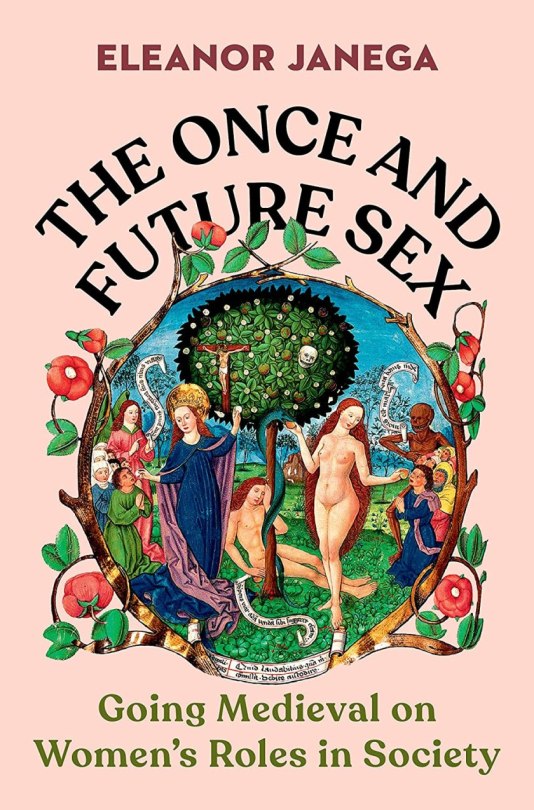
A history of gender and sex in the medieval age, describing the weird and horny ways of medieval Europeans, which are far gnarlier and more complicated than the story we get from "traditionalists" who want us to believe that their ideas about gender roles reflect a fixed part of human nature, and that modern attitudes are an attempt to rewrite history:
https://pluralistic.net/2023/01/17/ren-faire/#going-medieval
II. Pirate Enlightenment by David Graeber
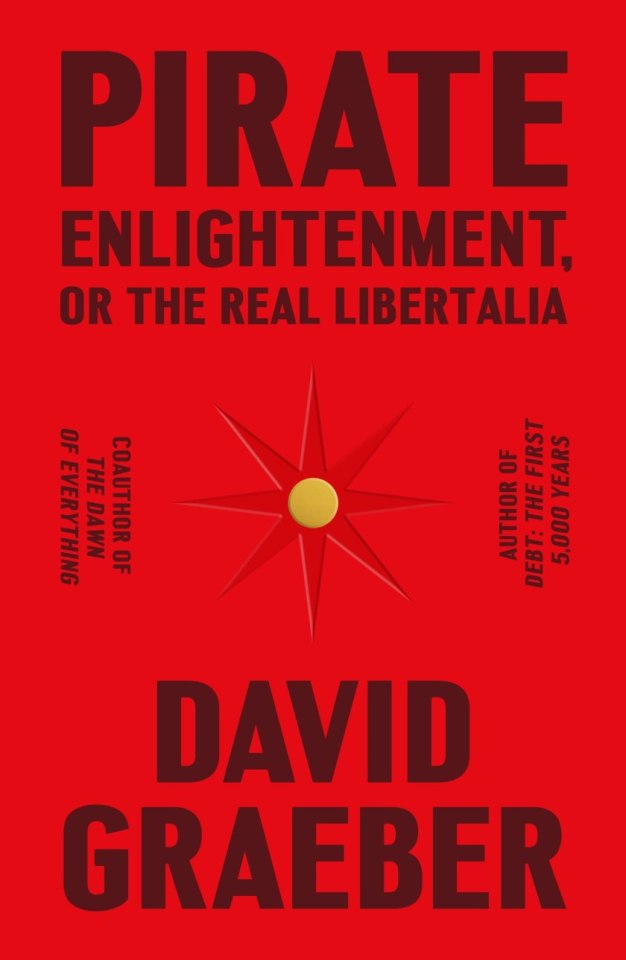
In the early 18th century, the Zana-Malata people – a new culture created jointly by pirates from around the world and Malagasy – came to dominate the island. They brought with them the democratic practices of pirate ships (where captains were elected and served at the pleasure of their crews) and the matriarchal traditions of some Malagasy, creating a feminist, anarchist "Libertalia." Graeber retrieves and orders the history of this Libertalia from oral tradition, primary source documents, and records from around the world. Taken together, it's a tale that is rollicking and romantic, but also hilarious and eminently satisfying.
https://pluralistic.net/2023/01/24/zana-malata/#libertalia
III. A Hacker's Mind by Bruce Schneier
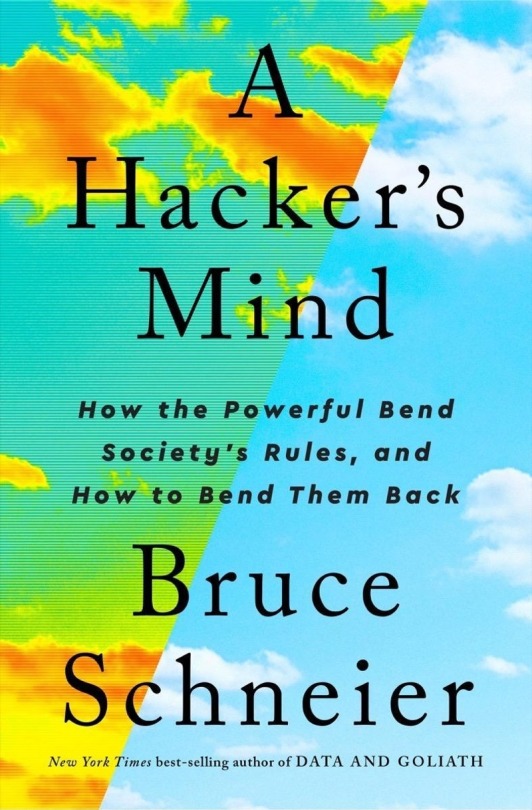
Schneier broadens his frame to consider all of society's rules – its norms, laws and regulations – as a security system, and then considers all the efforts to change those rules through a security lens, framing everything from street protests to tax-cheating as "hacks." This leaves us with two categories: hacks by the powerful to increase their power; and hacks by everyone else to take power away from the powerful.
https://pluralistic.net/2023/02/06/trickster-makes-the-world/#power-play
IV. Responding to the Right by Nathan J Robinson
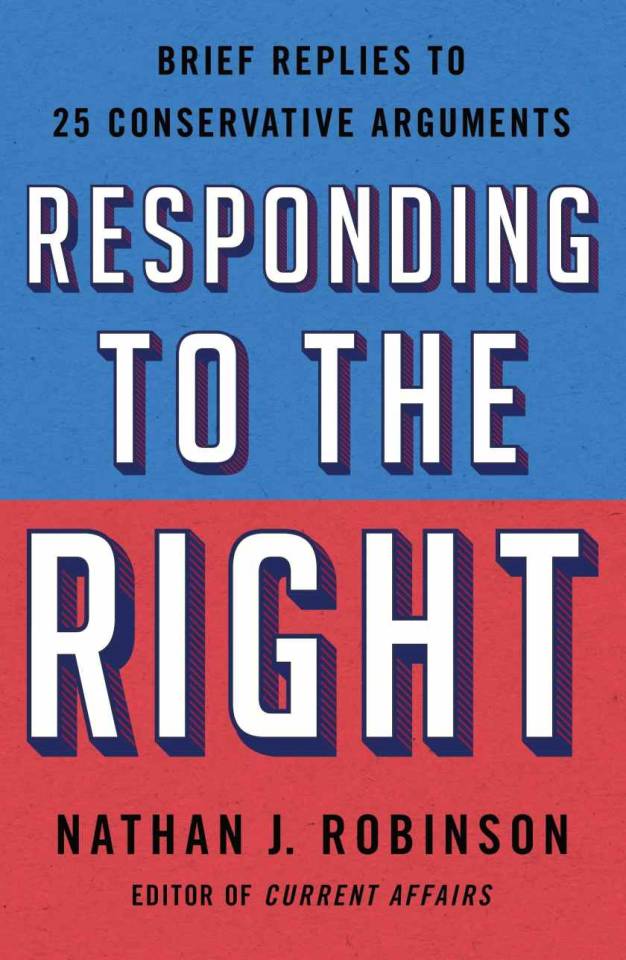
Robinson describes conservativism as a comforting, fixed ideology that allows its adherents to move through the world without having to question themselves: you broke the law, so you're guilty. No need to ask if the law was just or unjust. This sidelines sticky moral dilemmas: no need for judges to ask if something is good or fair – merely whether it is "original" to the Constitution. No need for a CEO to ask whether a business plan is moral – only whether it is "maximizing shareholder benefit." Robinson anatomizes the most effective parts of conservative rhetoric and exhorts his leftist comrades to learn from it, and put it to better use.
https://pluralistic.net/2023/02/14/nathan-robinson/#arguendo
V. A Collective Bargain by Jane McAlevey
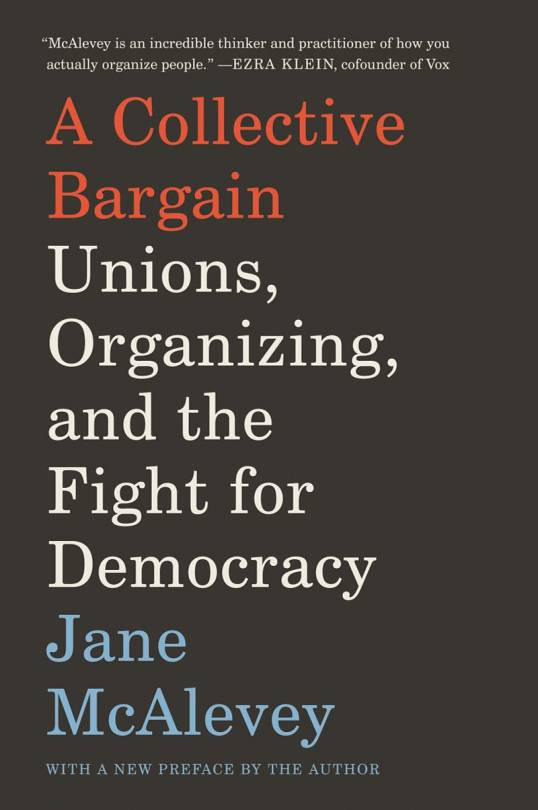
An extraordinary book that is one part history lesson, one part case-study, two parts how-to manual, one part memoir, and one million parts call to action. McAlevey devotes the early chapters to the rise and fall of labor protections in America, explaining how the wealthy mounted a sustained, expensive, obsessive fight to smash union power. She moves into a series of case-studies of workers who tried to organize unions under these increasingly inhospitable rules and conditions. The second half of the book is two case studies of mass strikes that succeeded in spite of even stiffer opposition. For McAlevey, saving America is just a scaled up version of the union organizer’s day-job.
https://pluralistic.net/2023/04/23/a-collective-bargain/
VI. Open Circuits by Windell Oskay and Eric Schlaepfer

A drop-dead gorgeous collection of photos of electronic components, painstakingly cross-sectioned and polished. The photos illustrate layperson-friendly explanations of what each component does, how it is constructed, and why. Perhaps you've pondered a circuit board and wondered about the colorful, candy-shaped components soldered to it. It's natural to assume that these are indivisible, abstract functional units, a thing that is best understood as a reliable and deterministic brick that can be used to construct a specific kind of wall. Peering inside these sealed packages reveals another world, a miniature land where things get simpler – and more complex.
https://pluralistic.net/2023/08/14/hidden-worlds/#making-the-invisible-visible-and-beautiful
VII. Doppelganger by Naomi Klein
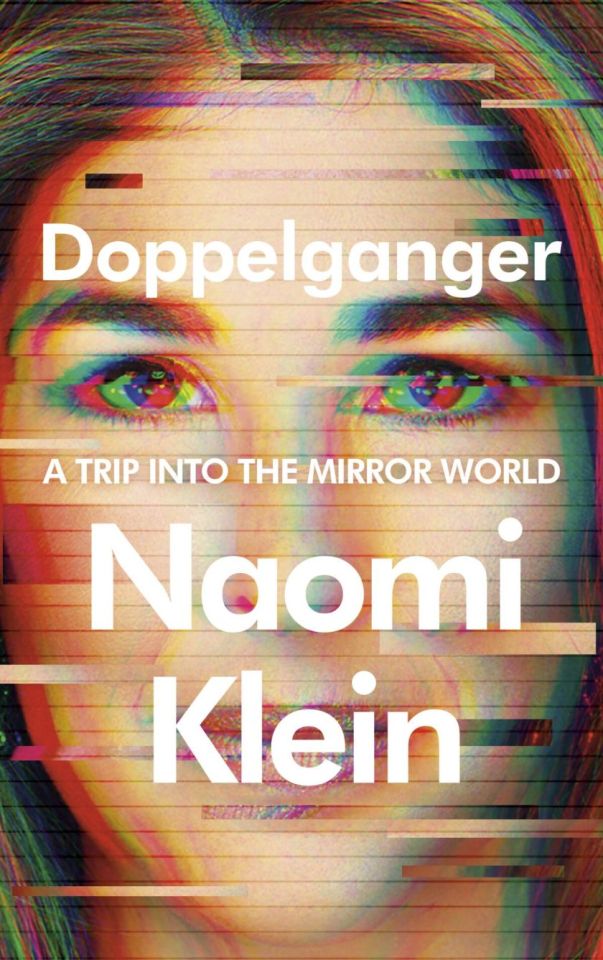
This is a very odd book. It is also a very, very good book. The premise – exploring the divergence between Naomi Klein and Naomi Wolf, with whom she is often confused – is a surprisingly sturdy scaffold for an ambitious, wide-ranging exploration of this very frightening moment of polycrisis and systemic failure. For Klein, the transformation of Wolf from liberal icon – Democratic Party consultant and Lean-In-type feminist icon – to rifle-toting Trumpling with a regular spot on the Steve Bannon Power Hour is an entrypoint to understanding the mirror world. How did so many hippie-granola yoga types turn into vicious eugenicists whose answer to "wear a mask to protect the immunocompromised" is "they should die"?
https://pluralistic.net/2023/09/05/not-that-naomi/#if-the-naomi-be-klein-youre-doing-just-fine
VIII. Your Face Belongs to Us by Kashmir Hill
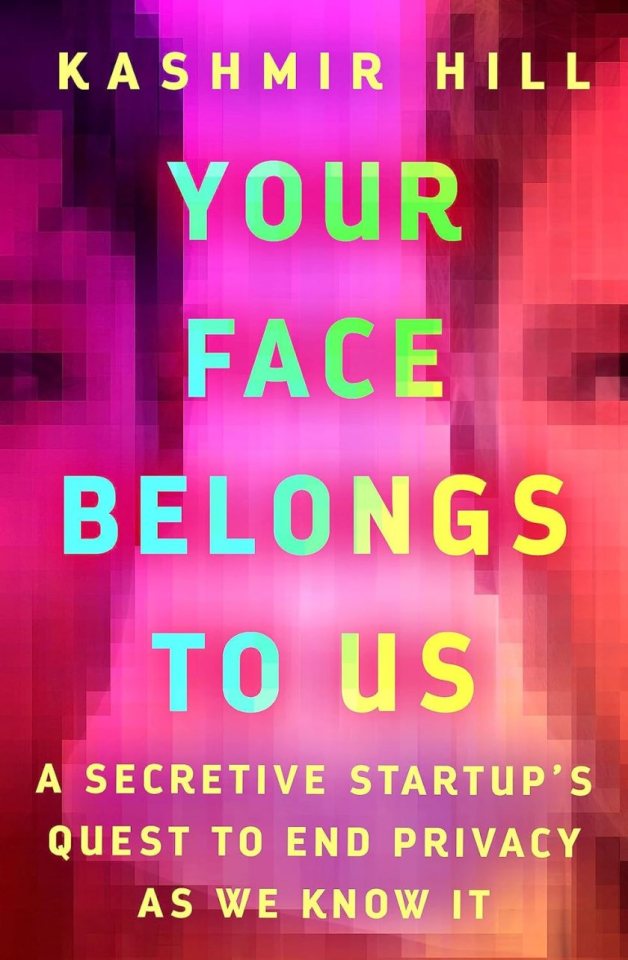
A tell-all history of Clearview AI, the creepy facial recognition company whose origins are mired in far-right politics, off-the-books police misconduct, sales to authoritarian states and sleazy one-percenter one-upmanship. Facial recognition is now so easy to build that – Hill says – we're unlikely to abolish it, despite all the many horrifying ways that FR could fuck up our societies.
https://pluralistic.net/2023/09/20/steal-your-face/#hoan-ton-that
IX. Blood In the Machine by Brian Merchant
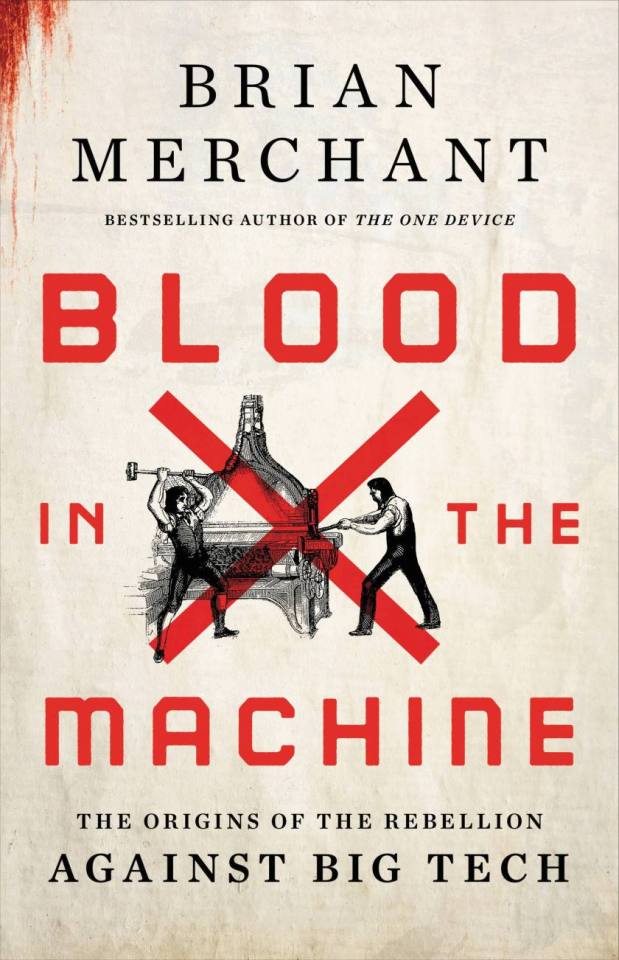
The definitive history of the Luddites, and the clearest analysis of the automator's playbook, where "entrepreneurs'" lawless extraction from workers is called "innovation" and "inevitable." Luddism has been steadily creeping into pro-labor technological criticism, as workers and technology critics reclaim the term and its history, which is a rich and powerful tale of greed versus solidarity, slavery versus freedom. Luddites are not – and have never been – anti-technology. Rather, they are pro-human, and see production as a means to an end: broadly shared prosperity. The automation project says it's about replacing humans with machines, but over and over again – in machine learning, in "contactless" delivery, in on-demand workforces – the goal is to turn humans into machines.
https://pluralistic.net/2023/09/26/enochs-hammer/#thats-fronkonsteen
X. Technofeudalism by Yanis Varoufakis
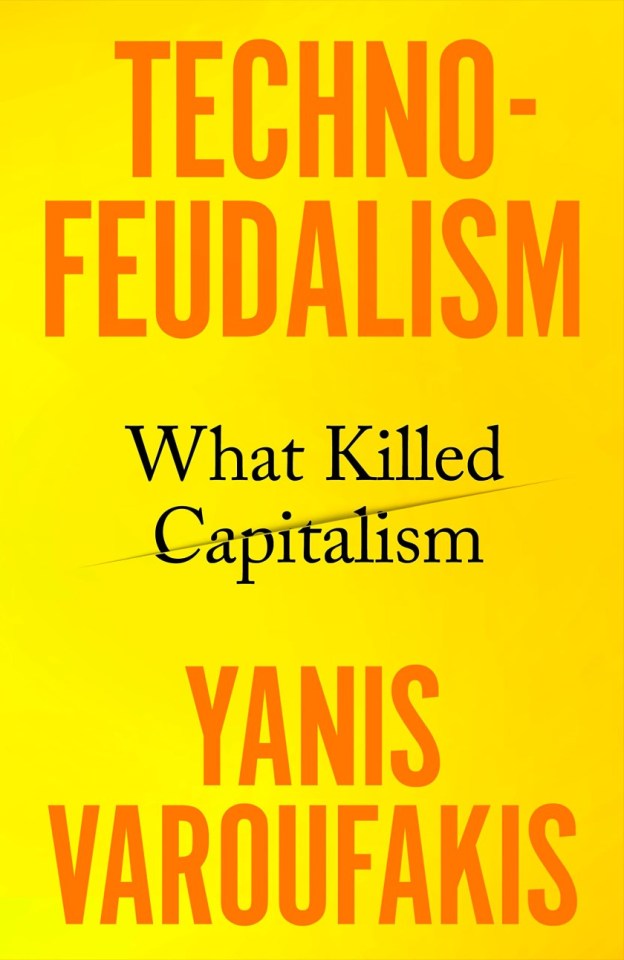
Varoufakis makes an excellent case that capitalism died a decade ago, turning into a new form of feudalism: technofeudalism. A feudal society is one organized around people who own things, charging others to use them to produce goods and services. In a feudal society, the most important form of income isn't profit, it's rent. Varoufakis likens shopping on Amazon to visiting a bustling city center filled with shops run by independent capitalists. However, all of those capitalists are subservient to a feudal lord: Jeff Bezos, who takes 51 cents out of every dollar they bring in, and furthermore gets to decide which products they can sell and how those products must be displayed. The postcapitalist, technofeudal world isn't a world without capitalism, then. It's a world where capitalists are subservient to feudalists ("cloudalists" in Varoufakis's thesis), as are the rest of us the cloud peons
https://pluralistic.net/2023/09/28/cloudalists/#cloud-capital
XI. Underground Empire by Henry Farrell and Abraham Newman
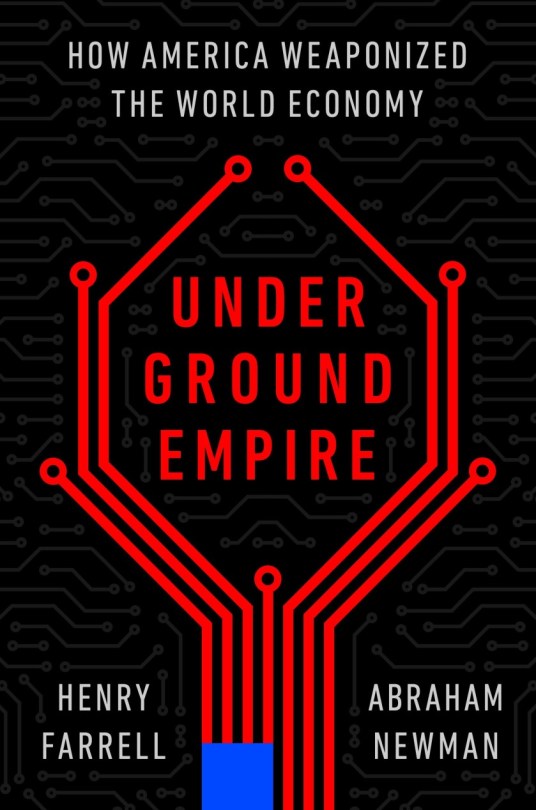
Two political scientists tell the story of how global networks were built through accidents of history, mostly by American corporations and/or the American state. The web was built by accident, but the spider at its center was always the USA. At various junctures since the Cold War, American presidents, spies and military leaders have noticed this web and tugged at it. A tariff here, a sanction there, then an embargo. The NSA turns the internet into a surveillance grid and a weapon of war. The SWIFT system is turned into a way to project American political goals around the world – first by blocking transactions for things the US government disfavors, then to cut off access for people who do business with people who do things that the US wants stopped. Political science, done right, has the power to reframe your whole understanding of events around you. Farrell and Newman set out a compelling thesis, defend it well, and tell a fascinating tale.
https://pluralistic.net/2023/10/10/weaponized-interdependence/#the-other-swifties
XII. How Infrastructure Works by Deb Chachra

A hopeful, lyrical – even beautiful – hymn to the systems of mutual aid we embed in our material world, from sewers to roads to the power grid. It's a book that will make you see the world in a different way – forever. It's a bold engineering vision, one that fuses Chachra's material science background, her work as an engineering educator, her activism as an anti-colonialist and feminist. The way she lays it out is just…breathtaking.
https://pluralistic.net/2023/10/17/care-work/#charismatic-megaprojects

Like I said, this has been a good year in books for me, and it included three books of my own:
I. Red Team Blues
(novel, Tor Books US, Head of Zeus UK)
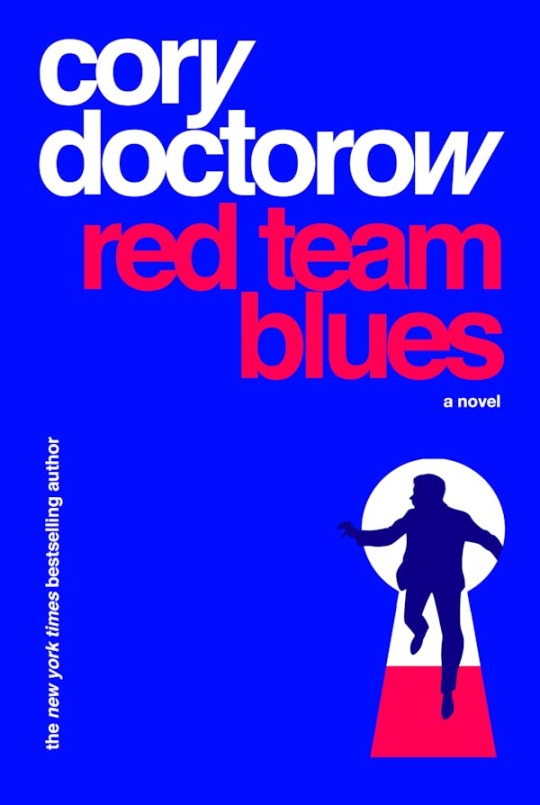
Martin Hench is 67 years old, single, and successful in a career stretching back to the beginnings of Silicon Valley. He lives and roams California in a very comfortable fully-furnished touring bus, The Unsalted Hash, that he bought years ago from a fading rock star. He knows his way around good food and fine drink. He likes intelligent women, and they like him back often enough. Martin is a—contain your excitement—self-employed forensic accountant, a veteran of the long guerilla war between people who want to hide money, and people who want to find it. He knows computer hardware and software alike, including the ins and outs of high-end databases and the kinds of spreadsheets that are designed to conceal rather than reveal. He’s as comfortable with social media as people a quarter his age, and he’s a world-level expert on the kind of international money-laundering and shell-company chicanery used by Fortune 500 companies, mid-divorce billionaires, and international drug gangs alike. He also knows the Valley like the back of his hand, all the secret histories of charismatic company founders and Sand Hill Road VCs. Because he was there at all the beginnings. Now he’s been roped into a job that’s more dangerous than anything he’s ever agreed to before—and it will take every ounce of his skill to get out alive.
https://us.macmillan.com/books/9781250865847/red-team-blues
II. The Internet Con: How to Seize the Means of Computation
(nonfiction, Verso)

We can – we must – dismantle the tech platforms. We must to seize the means of computation by forcing Silicon Valley to do the thing it fears most: interoperate. Interoperability will tear down the walls between technologies, allowing users to leave platforms, remix their media, and reconfigure their devices without corporate permission. Interoperability is the only route to the rapid and enduring annihilation of the platforms. The Internet Con is the disassembly manual we need to take back our internet.
https://www.versobooks.com/products/3035-the-internet-con
III. The Lost Cause
(novel, Tor Books US, Head of Zeus UK)

For young Americans a generation from now, climate change isn't controversial. It's just an overwhelming fact of life. And so are the great efforts to contain and mitigate it. Entire cities are being moved inland from the rising seas. Vast clean-energy projects are springing up everywhere. Disaster relief, the mitigation of floods and superstorms, has become a skill for which tens of millions of people are trained every year. The effort is global. It employs everyone who wants to work. Even when national politics oscillates back to right-wing leaders, the momentum is too great; these vast programs cannot be stopped in their tracks.
But there are still those Americans, mostly elderly, who cling to their red baseball caps, their grievances, their huge vehicles, their anger. To their "alternative" news sources that reassure them that their resentment is right and pure and that "climate change" is just a giant scam. And they're your grandfather, your uncle, your great-aunt. And they're not going anywhere. And they’re armed to the teeth. The Lost Cause asks: What do we do about people who cling to the belief that their own children are the enemy? When, in fact, they're often the elders that we love?
https://us.macmillan.com/books/9781250865939/the-lost-cause

I wrote nine books during lockdown, and there's plenty more to come. The next one is The Bezzle, a followup to Red Team Blues, which comes out in February:
https://us.macmillan.com/books/9781250865878/thebezzle
While you're waiting for that one, I hope the reviews above will help you connect with some excellent books. If you want more of my reviews, here's my annual roundup from 2022:
https://pluralistic.net/2022/12/01/bookishness/#2022-in-review
Here's my book reviews from 2021:
https://pluralistic.net/2021/12/08/required-ish-reading/#bibliography
And here's my book reviews from 2020:
https://pluralistic.net/2020/12/08/required-reading/#recommended-reading


It's EFF's Power Up Your Donation Week: this week, donations to the Electronic Frontier Foundation are matched 1:1, meaning your money goes twice as far. I've worked with EFF for 22 years now and I have always been - and remain - a major donor, because I've seen firsthand how effective, responsible and brilliant this organization is. Please join me in helping EFF continue its work!

If you'd like an essay-formatted version of this post to read or share, here's a link to it on pluralistic.net, my surveillance-free, ad-free, tracker-free blog:
https://pluralistic.net/2023/12/01/bookmaker/#2023-in-review
54 notes
·
View notes
Note
I wanna start reading Arthurian…..where should I begin
*rubs hands* oh excellent
I'd say one way would be to pick characters or events you'd like to read about the most and start with the texts focusing on them. @fuckyeaharthuriana has a lot of lists of different works, including those sorted by character (links in the blog description). Then, if you decide you enjoy Arthuriana in general, you can move to other texts. Another way would be to start with something well-known and short. I believe Sir Gawain and the Green Knight fits the bill well. The translation linked is more like an example, because there's a lot of them, and I frankly don't know which to suggest best; the one I read is by Bernard O’Donoghue, but I can't find it online. I've also heard very good things about Tolkien's translation - understandable, because duh, Tolkien - but haven't read it (yet). The works of Chrétien de Troyes are also very good and readable and imo very well represent what a medieval romance is. My favourite is Yvain: Knight of the Lion, and I haven't read his Perceval yet, but I liked all the other of his romances too. (Ok, maybe not Erec and Enide, but that's because I found the main character very annoying)
I've compiled a small list of Arthurian texts I recommend before when answering a similar ask, and I still stand by it, except, taking into account what I've read since then, I'd also add La Tavola Ritonda - an Italian Arthurian romance mostly focused on Tristan and Isolde, weird and violent but also very enjoyable, in my opinion, Parzival (vol. 1, vol. 2) by Wolfram Von Eschenbach - a German romance and my favourite version of the Grail story so far, and Lancelot-Grail aka the Vulgate Cycle + the Post-Vulgate. I'm not sure starting with the latter is a good idea, though, because it's five huge volumes, very readable (except for The History of the Holy Grail. You can skip that, if you ask me) and with a great impact on the later Arthurian texts, including Le Morte d'Arthur, but HUGE, it took me half a year, lol. (Le Morte is also long and often drier in style, but still not THAT long). But I simply had to mention it because it's such a foundational work. A part of the Vulgate Cycle has been adapted by Patricia Terry and Samuel N. Rosenberg as Lancelot and the Lord of the Distant Isles or, The Book of Galehaut Retold. It's short and beautiful, and you don't need to be familiar with the rest of the Vulgate to read it.
Oh, and if you're interested in more modern retellings, Idylls of the Queen by Phyllis Ann Karr is an episode from Le Morte d'Arthur retold as a murder mystery solved by Kay and Mordred, and it's amazing. Also The Squire's Tales series by Gerald Morris is a lot of fun, kind of for a younger reader but very well-written and funny, even though some of his choices regarding certain characters drive me up the wall a little bit.
Also, here's a great site by @tillman with a lot of links to various Arthurian texts!
#this is very chaotic i'm sorry#asks#kitsnicket#arthurian legends#arthuriana#gella talks arthuriana#talk talk talk
67 notes
·
View notes
Note
You mentioned Clark Ashton Smith. Which of his stories would you recommend? So far I've been underwhelmed.
Context for anyone who doesn't know: Clark Ashton Smith was one of the "Big Three" of Weird Tales (the other two being Lovecraft and Robert E. Howard) and is certainly the least famous. Even if you don't know who Lovecraft or Howard are, you've probably heard of Cthulu and Conan the Barbarian. Smith is also certainly the weirdest of them all by a good margin and the most inconsistent in his writing. You pick up a Lovecraft story and 90% of the time it's going to be at least competently written and you know the broad strokes of what the content will be (unnameable cosmic horrors, nervous breakdowns, and often very explicit racism). A Smith story is just as likely to feel like it was written by an accomplished poet as it is to feel like a teenager's drivel. And it could be about wizards at the end of time, or spacewrecked astronauts, or medieval French bishops. The only consistent thing about his work is that you'll need a dictionary by your side while you read it. Get ready for words like "mephitic," "hippocephalic," and "cyclopean" to be abused in ways that even Lovecraft probably found egregious. (Emperor of Dreams? More like Emperor of Purple Prose! Haha, good joke Logan.) The bizzarity and unevenness of his output are probably the qualities that I find so engaging about it and also the things that have kept him from being as beloved as his peers into the present day.
Anyway, I haven't done a deep-dive on Smith since I read his complete works all the way through. Some of his stories are pretty fresh in my mind, but most of them I haven't read in 5-6 years. Keep all that in mind and I'll put my recommendations below the break:

"The Vaults of Yoh-Vombis": Definitely my personal favorite Smith story and probably one of his best. If you don't like this one, it's unlikely you'll be a fan. On its own a very good "ancient cosmic horror" story, what really makes it stand out is it's setting: a near-future (relative to the 1932 publication date) Mars that has been colonized (in a very 19th century sense of the word) by humans. The Martian city of Ignarh is apparently a hub for interplanetary commerce and the subaltern Martian indigenous population provide local guides for human archaeologists to study (and no doubt exploit) the ruins of ancient civilizations that abound on the planet. Smith wrote two other stories in the same setting, "The Dweller in the Gulf" and "Vulthoom" that re-tread the same plot beats but lend a little more color to the Martians themselves. A writer capable of viewing the Martians as sympathetic peoples rather than as "native savages" could've spun this setting into something truly great. Richard Corben also does a fantastic comic adaptation.
"The Abominations of Yondo": Didn't like the first recommendation? I'll take one more shot at making you a fan. "Abominations" is a very short read that manages to contain all the hallmarks of a classic Smith story. Nobody else does it like him and if you don't like it then you just don't like it.
"City of the Singing Flame": A story of inter-dimensional exploration that manages to weave together Smith's obvious love for his home state of California with his penchant for imaginary places beyond time and space. It has a sequel that I thought was okay but most people dislike. If you like this story, it's probably better to treat it as a standalone.
"A Night in Malnéant": A somber, dreary horror tale that I don't think gets enough love or at least isn't anthologized particularly often. Tones down the weirdness a bit, but in a good way.
"Isle of the Torturers": Far-future horror-fantasy that really sticks the ending. Also does the same thing as "Yoh-Vombis" where it has a setting that's only briefly introduced but could easily be spun into a full-on novel. Great Halloween read.
Off the top of my head, those are some of my personal favorites. "Return of the Sorcerer" gets anthologized a lot. It's not weird enough for me but I think it's considered one of his better stories. Similarly I'm not a big fan of his Averoigne cycle of stories (set in medieval France), but if you want some dark ages sword and sorcery, "Mother of Toads" and "The Colossus of Ylourgne" are the ones I liked best.
I'd also like to mention "The Great God Awto" which is a truly bad short story but notable for being one of the earliest pieces of anti-car fiction of which I'm aware. Predates Bradbury's "The Pedestrian" by more than a decade.
Also if you can't find any of Smith's work at your local library, check out eldritchdark.org. I believe all his fiction is available for free here as well as his visual art and other resources.
45 notes
·
View notes
Text
Eclipse AU(Tldr at bottom of post_
So I made a modern-sort of percy jackson inspired AU for Linked Universe, I think it's fun to write! I hope other people enjoy it. Here's my weird rough summary. Willing to answer any and all questions!
The Chain are lost in time, trapped in an unending cycle of life and death. A familiar tale to the hero's spirit. In their last confrontation with the incarnations of demise, and the demons he commanded--the whole of reality went asunder, and the power of the gods shattered entirely.
After that confrontation--the nine embodiments of the hero’s spirit suffered the same fate as their homeland--their souls washed away in caskets of golden tears and failed promises.
Hyrule was wiped away, wiped from the face of history and beyond. The goddesses had to begin their creation anew, without the baggage of those that caused it’s destruction in the first place.
Earth, modern earth, was created in it’s place--with a few key changes.
For all their efforts--the remains of their first creation leaked through, infecting the history of our earth like vile rot. The monsters were the first to make the breach, their combined hatred and inhuman will to survive holding their corrupted essences together through the transition.
There are stories of these creatures, often disregarded as exaggerated hyperbole by historians, or metaphors for natural disasters.
They were not.
The Queen Gohma haunts the jungles of South America, legends of her urchin-like young making victims of unfortunate wanderers; sustaining her immortal lifespan in the depths of her hollowed tree.
Argorok terrorized the skies of medieval Europe, casting plumes of fire on the feudal armies that tried opposing it’s oppressive reign; her accompanying packs of gleeoks hunting ancient sailors in the atlantic.
And there were many, so many more monsters that endured the chaotic folding of time and space, the near-annihilation of any sense of self--as the mind and soul were put to battle against the last, drawn out gasps of their dying universe. The destruction was biblical, the return of gods seen only in legend--it’s a wonder that anything survived that cataclysm.
The chain suffered a similar fate--at first--their existence and histories torn apart atom by atom, their souls stretched paperthin as thought and reality blended together during the collapse of stars.
But they endured.
They tumbled through the new cosmos, the echoes of their shared spirit melding into the foundation of the universe--as immovable as gravity. When humanity came to prominence; the chain were there to follow. They were reborn, stripped of their memories, into a thousand different societies, and countless eras.
At times of crises and devastation; their nine courageous souls were reborn across the earth, their courage burning brighter than it had been before. They were prepared for the changing world, their skills old and new continuing with each reset.
There are some echoes of continuity, however, rules that their spirit must follow.
Twilight is related to time in some way, and they’re the two who meet again the most.
Wind is always born in sea-faring communities, whether that be in the literal age of pirates, or as an early tribesmen at the dawn of civilization--rediscovering his aptitude for sailing.
And as the chain have been reborn, so too have many of Hyrule’s legends, their essences bleeding forth onto our realm. The memory of that primeval history scars our world, and fragments of every era hides under the bustling, nation-states of our modern age.
Some more aware than others.
Those with the blood of Hylia returned, bringing the memory of their goddess with them--thought to be eradicated. They possess no royal heritage, living as normal citizens, the zeldas being born nearby their links.
The sheikah bounced back quickly, as Impa(SS) managed to come out of the transition with her memories intact--assembling her fractured tribe during the stone ages.
TLDR: Modern AU that’s sort of percy jackson in how Hyrule seeps over. Ancient things hidden in modern times, with the chain reborn worldwide.
#linked universe#linkeduniverse#fanfic#lu au#linked universe fanfic#linked universe au#eclipse au#involves alot of time travel#not sure if I want a long term story for it but I have alot of oneshot ideas#lu chain#linked universe chain#lu time#lu twilight#casting these chain tags like candy on a fishing rod#lu impa#lu sky#lu warriors#lu wind
50 notes
·
View notes
Text
Whatever Happened to Dr. Rabbit
Hello, one and all. I'm IrysGundam005, and I see everything.
So, I've got a theory for you all. Thanks to the end of HW2, it seems that Vanny is still kicking around. Considering that it's implied that the Princess Quest ending is the cannon ending of Security Breach, that means that Van-Van is most likely her own rabbit free of Vanessa and working on her own terms.
However, as we know, Vanessa wasn't the only one possessed by Glitchtrap. Gregory himself has been heavily hinted to have fallen under the thrall of the golden rabbit but was freed through some means. If so, then that just begs a question.
Where the hell did Dr. Rabbit go?
After all, if Vanny is still kicking around, can't the same be said for him? One of the Tales from the Pizzaplex books implies that separate personalities like this can remain even after being separated from the original. And while apparently that was between a actual person and a split personality, it can still be applied to those possessed by AIs.
So where the hell did he run off to?
Well, I think we've been looking at him the entire time.
He is in the Daycare Attendant!
Specifically, he has latched onto the Moon. His what's causing Moon to behave so weird and aggressive.
And there are a few reasons I point to DC and Moon in particular.
1: Gregory's personal Princess Quest game, the Balloon World game, is in the Daycare Attendant's private room. Considering that we see endoskeletons that have been taken apart littering the place, this was probably another room for Gregory in the Pizzaplex while he was living there as GGY. He was using the DC to gather up endos for him to rip apart and study.
2: Moon is a predominately blue and white character with star patterns on his pants. Gregory's clothing is predominately blue and white, and what does Freddy call him? A Super"star"!
3: I've heard Moon described as a "scrunkly gremlin jester". Do you know who else that can apply to? Gregory. He is a scrunkly little gremlin, and as far as being a jester is concerned, I have come to believe that his Dr. Rabbit costume was most likely inspired by Circus Bonnie. There are a lot of reasons why.
*The color scheme of Circus Bonnie matches both Gregory and Moon. He is a predominately blue and white-character. He has two stripes on each of his ears akin to Gregory's shirt. He carries around an orange accessory like Gregory with his Faz-Watch. In this case, it's a carrot wand with a star-shaped tip. Now what has Gregory been described as? Both "The Wizard's Most Favored Apprentice" and a "Superstar". In addition, Circus Bonnie has bells attached to his ears like the Daycare Attendant have on their body. Even Circus Bonnie's purple eyes could be a subtle nod to Glitchtrap.
*The Circus Animatronics were released around the time RUIN was gearing up to be released and were supposed to have a teaser for it in RUIN itself.
*The Jester theme fits in with the medieval fantasy motif of the Princess Quest game (Vanessa the Princess, Glitchtrap the Wizard, and Gregory the Jester). Since Jesters were entertainers for the ruling monarchs, you could think of it as Gregory entertaining Glitchtrap (who is the Mimic's AI copying William Afton) by being forced to live out Glitchtrap's fantasies (i.e., the Another David theory).
*Gregory is an accurate representation of the Fool Tarot (jesters were often called "fools") and the word "gestour" to which Jester originates is a word that means either "minstrel" or "storyteller". The story GGY, which confirmed Gregory was Patient 46, was included in the same volume of the Tales from the Pizzaplex books as The Storyteller. The Storyteller was the story that introduced both the titular device (the Mimic's head uploaded into a white tiger bust and then installed in an artificial baobab tree) and the character of Edwin Murray. The one who created the Mimic in the first place. Also. The Fool Tarot is often represented by either a jester or a young man with a white animal companion.
*The Mimic in the final epilogue was last seen trapped in a Springlock Jester costume.
4: A lot of Moon's in-game collectibles are found in locations I believe are heavily associated with Gregory.
*Moon Action Figure: Is in the Build-A-Mangle Room. This is significant as I believe Gregory was taken around the time of the Curse of Dreadbear DLC timeline-wise).
*Moon Plushie: It is found in the sunken ship in the Kid's Cove section which seemed to be another living space Gregory had.
*Golden Moon Plush: It is in the Daycare Attendant's private room. Which, again, is where Gregory probably lived and is where the arcade game that kept his mind held is.
*EDIT: Here's a new one for you. The Sun action figure is found in a room that is very similar to the start-up screen for The Curse of Dreadbear DLC. Not Moon, but still a DCA connection.
5: Whenever Moon is unleashed during the hourly recharges, Gregory's vision gains a blue taint. Do you know who else messes with Gregory's vision? Vanny. Considering that Gregory most likely has an occipital transponder chip in his head (which would have allowed Glitchtrap to take control over him), Vanny's mask most likely has something in it that's causing his vision to get messed up thanks to that chip. Moon is most likely doing the same as well. And why would he? Because if Dr. Rabbit is possessing him, the AI most likely added something onto Moon to cause that effect. Or Rab himself could cause it by his presence alone.
6: Moon behaves in a rather creepy and eerie fashion. In the Retro CDs, Gregory, while he was under the control of the Mimic, was said to like eerie things more than entertaining ones. Backed up further by the fact that, while Moon's plushie depicts him with one red eye and one blue eye, Moon is only ever seen with either two red eyes or (as is the case in the Princess Quest Ending for HW2) solid black eyes. The Moon action figure, which is found in the Build-A-Mangle Room, has two black eyes.
7: Moon's jumpscare is rather mild compared to everyone else. All he does is just wiggle his fingers at Gregory and leers at him. No indication that he causes him physical harm. And Gregory's vision clears up unlike with Vanny's jumpscare where the red only intensifies. Why is that? If Moon is possessed by Dr. Rabbit, then the latter is most likely trying to reunite with his host. And the blue clearing up is Dr. Rabbit regaining control over his host.
EDIT: Okay. So I decided to watch Moon's jumpscare again, and it looks like Gregory's vision doesn't clear up. However, that said, this point still applies, as the same happens with Vanny as well.
8: Moon is thus far, the only one of the new animatronics to receive a Halloween variant: Jack-O-Moon. Remember what I said about being taken around the time of the Curse of Dreadbear DLC? What was that themed around again? This also ties back into the first point: his design is inspired by the Eclipse we see in the Balloon World game. The same game housing Gregory's mind.
EDIT: Also in regards to this part. The portions of HW2 Jack-O-Moon shows up in? Glitchy and purple.
9: Tieing into Point 5, Moon is the only enemy capable of dragging Gregory out of Freddy. Chica, Roxy, and Monty won't even so much as touch Freddy even if Gregory jumps into him right in front of them. But Moon will go for Gregory inside of Freddy. This indicates that he knows Gregory is in there. Possibly because Rab would know his old host is hiding inside of Freddy. This would also explain why Vanny knows to check in there as well. She most likely worked with Rab, and thus, would know his host's hiding habits.
10: Playing off of Point 9, Moon is also the only animatronic to show outward aggression towards Freddy. Based on what we hear when Gregory is hiding inside the recharge station, it's possible that Moon outright attacked Freddy before dragging him into Parts and Services. If Rab is infecting Moon, it's possible he held some resentment over his former host and favorite animatronic teaming up against him.
11: In one of the Retro CDs, the first therapist mentions things related to the Daycare. She uses phrases such as "time out" and "troublemaker".
12: This one is a minor point, but is note worthy. Moon is typically depicted as having one of two coloration. The first is having both eyes red. The second is having one eye red, the other blue. I bring this up because at the end of HW2, he is shown with completely black eyes. The only time his shown with black eyes? His action figure. And where is the collectible of that found? In the Build-A-Mangle Room. And while his eyes are closer to amber in-game, other depicts of Gregory show his eyes being closer a dark-brown that boarders on black.
It is because of all this, that I believe that Dr. Rabbit is most likely inside of the DC and is influencing Moon. I think what happened is that one day, Moon got a little too curious for his own good and decided to play the Balloon World game, accidentally freed Gregory, and Rab jumped ship into the DC because, as a purely mechanical being, he can be taken over without the need of an occipital transponder chip. Either that, or whatever event that caused Rab to separate from Gregory most likely left him stuck in the Balloon World game, and then one day, Moon played it and he latched onto him.
In either case, Moon is now under the influence of Dr. Rabbit and is effectively his new host. Which, if true, then this explains the ending to HW2 and Moon's presence as the claw that delivers Glitchtrap to Vanny.
If Rab and Vanny are both freed from Gregory and Vanessa, then the two may have decided they are sick and tired of "Daddy Glitchtrap" and have teamed up to take him out. As we see with the ending to HW2 to with Rab delivering Glitchtrap's remaining code to Vanny so she can squash him. After all. Just because Dr. Rabbit was described as the wizard's most favored apprentice, doesn't mean it's outside the realm of possibilities that he has grown bitter towards Glitchtrap/Mimic following his separation from Gregory, and has decided to stop being an apprentice and started being a wizard himself. Not helped by the fact that I imagine being stuck in a body with the Sun and Moon hasn't helped his mood.
But hey, that's just my theory. Let me know what you think. :)
EDIT: On a side note, while thinking about this theory, I realized there is a subtle bit of brilliance to a character called Dr. "Rabbit" possessing a character called "Moon".
In East Asian mythology, there is the myth about the Moon rabbit. In Chinese mythology specifically, the rabbit (known as the Jade Rabbit) is the companion of the Moon goddess Chang'e, and is constantly pounding the elixir of life for her. You wanna know what can be considered an elixir of life in FNAF? Remnant. Metal infused with emotion and memory that can grant life to both animatronics and give immortality as shown with Michael.
EDIT: I would also want to point something out. Although Dr. Rabbit is described as being "the wizard's most favored apprentice", that doesn't mean he didn't feel the scorn of Glitchtrap on occasion. Much like how Elizabeth was William's golden child but he still abused her, it's entirely possible Rab suffered under Glitchtrap as well. It's just that unlike Elizabeth, Rab had an alternative person he could side with. One who probably hated Glitchtrap just as much as he grew to. And that person is Vanny.
#fnaf#gregory fnaf#fnaf daycare attendant#daycare attendent#daycare attendant sun#daycare attendant moon#dr. rabbit#five nights at freddy's#fivenightsatfreddysfanart#fnaf ggy#ggy#dr rabbit
14 notes
·
View notes
Note
Hello how are you ? may I request a Thomas tmr fic ( yes again !) it’s very weird I saw a headcanon about him and it was so cute sooo I had to ask you. It’s a magic/ medieval au when the reader is a villager living in front of the woods she heard thanks to tales told by her mother about some legendary being living in the trees. One time she ventures into the forest and comes face to face with Thomas a woodland in the beginning she was scared of him but by the time she fall in ✨love with him✨. It’s very weird ok ?! I’m sorry 🤣🙏
oh this is good. vibes off the charts
masterlist

Everyone knows about the Beings. Few have actually seen them. That doesn’t stop the stories from spreading.
In the small village of your birth and subsequent upbringing, it is easy to mistake strangeness for menace. The rules are simple, unspoken, and followed blindly: do not stray too far from the village gates, do not go out after dark, and most importantly, do not think that you can get away with visiting those that live beyond your reach. The Beings are separate for a reason, and they are not to be trusted.
It is obvious to all who live inside the boundaries of your town that the outside world is dangerous. Your ancestors came here a very long time ago and fought a very hard war to make it work. It is this place or nothing else; the ocean encloses your island on all sides, but with the untamed forests sprouting up in between the shores and your village, you haven’t seen the water in your entire life. No one has.
Sometimes, you have dreams that tell you otherwise. One rusting ship carrying dozens of starving, terrified people to a place free of violence and horror. You can hear snippets of conversation, their words muted with grief. They speak of events that have never been recorded in your history books, monsters and men with names utterly unfamiliar to you. You would think it was nothing but a nightmare were it not for the fact that it seems so crushingly real.
This is the part where the village elders step in and tell you to stop indulging yourself in such wild flights of fancy. Thinking about what lies beyond the walls of your settlement is not proper thought at all. The founders of this town made unimaginable sacrifices so that your father and your father’s father and the father before that could live in peace. When you ask what battles they fought, you are reprimanded. Details were only made for the dead to hear, not the living to truly care about. You’d do well to stay silent and move on.
Moving on, however, is the one thing you cannot do. You are surely not the only wildhearted child of this village to grow up and wonder why the rules are so strict. If it feels like that, perhaps it’s because the other wide-eyed explorers of your town have all been crushed without another word. You refuse to join their ranks.
In truth, you already know another like you. Your mother understands your need to push beyond the expectations of the village elders, and in the dark of night, she whispers to you stories of what truly lives past the shadow of the walls, why your village was raised to lock its doors and shut out intruders. It all has to do with the world your ancestors escaped when they fled here.
It happened a long time ago, of that much she is certain. Most of the facts of the stories have long since disappeared, evaporating from the heat of the too-bright sun. It wasn’t always that hot, she says. It’s getting better, but at one point the flares of the sun didn’t burn quite so badly into your back when you headed out in the morning. The world is healing, but it takes its time, licking its wounds as it watches the rest of you suffer.
After the sun lost its mind, the rest of the population did too. Madness swept the lands, monsters roamed the hills. The main characters of such stories always try to find a way to save the day, and in those times, people did the same. Their solutions were more cruel than successful, however, and in the end the real heroes ran away from their wicked oppressors and came here, a place where they would be free. They watched the fires burn across the world they left behind and promised that they would never leave this island, the one place they could truly go without fear. Their one Safe Haven.
No moment of peace lasts forever, though, not in this world. You cannot turn your back on one monster without another taking its place. Soon, rumors spread about the Beings, unknown supernatural foes that lurk outside of the village. If the old stories are to be believed, they were once people who lived in this very town. Something happened to make them leave, and now they roam the outskirts of the island still, keeping to themselves, letting the shadows of the forest keep away any intruders.
You always found that part a little hard to believe. There’s no way anyone from the initial wave of people could have possibly lived this long, especially if they were on their own in the forest. Whenever you raised this point with your mother, however, she just shrugged and said that this particular bunch were rather adept at surviving under difficult circumstances. She wouldn’t put it past them to have made it this far.
You can’t ask anyone else their opinion on the matter, as such conversations are kept solely within the walls of your own home. To speak of the Beings is seen as encouraging the townspeople to leave the borders of the village and seek out danger. After all that your ancestors gave up to protect this dream of a normal life, how could you possibly be so selfish as to want something more?
You can answer that hypothetical question quite easily. What is the point of endless sacrifice if you do not use it? This island was once clear, full of rolling hills and burbling streams, but it’s long since fallen into disrepair. Thick, dense forests crowd out the horizon, stretching tall up to the sky as if to cast a permanent shadow on the backs of those who live in the village. It is impossible to go about your business without feeling the weight of the wilderness pressing in on you.
It should come as no surprise, then, that at last you could take it no longer. If you do not find out the truth about the Beings, you think you might die. So, if you’re seen slipping out of your bed in the early morning before even the farmers rise, it should at least be expected that you would be headed towards the forest.
You bring a few things with you; some food and water, a cloak in case the shadows are even half as cold as they seem, a compass, a blade. The knife is kept close at hand, although you hope not to use it. All this time, you’ve been promising that you never once believed in the Beings, but something about having to go into their homeland steals a little of that confidence from you.
At last, you’re setting off in search of the truth. The shine of the dawn lights your path for you and you sneak away from the streets of the village. The gates are tall and thick, but you find a way out nonetheless. Soon enough, you’re walking briskly towards the wall of vegetation known affectionately to the townspeople as the terrible, cursed forest, and at last it swallows you whole.
It is much darker in the forest, but as you walk, patches of golden sunlight filter in through the leaves and guide your way. It is quite beautiful here, actually. You could see why some immortal soldier would want to live out their endless days in the woods.
You have yet to see such undead creatures, though, no matter how far you creep into the forest. There are no signs of life, no indication that there is anything in here but you and the trees stretching on forever. You’ve almost given up hope of ever finding anything when someone coughs pointedly behind you.
You whip around instantly, knife flying to your hand. If the boy behind you is remotely afraid, though, he gives no sign of it.
“Easy,” he drawls, “Don’t put your eye out.”
You squint at him. There’s a figure half hidden in the shadow of a neighboring oak tree, and you can only make out the roughest details of his appearance.
“People of the village aren’t supposed to be here,” you say irritably.
You can see a sliver of a grin through the dark air. “I hope you’re going to give me an explanation for your presence, then. I’d hate to think that you’re trespassing for no reason.”
You’re about to demand that this boy give you a reason first when it occurs to you that this isn’t a boy from the village at all. Nobody was around, nobody saw you go. The only place this boy could have come from is the forest.
Your eyes widen and your grip tightens on the knife. “You’re one of them!”
The boy raises his hands in mock surrender. “Can I ask you to put down the knife again? If you know what I am, then you know I’m not really all that threatened by that small of a blade.”
You consider this a second, then decide he’s right. “Did immortality take away your fear of death?” You quip.
“On the contrary,” the boy whispers, “it made me want it more than anything. There are some people I would love to see again if I could only manage to die.”
You stare at the boy in the shadows, and slowly, carefully, he emerges from the depths of the woods. You don’t know what you were expecting of the creatures of the forest, but this is certainly not it. You’re face to face with a boy who seems about your age. His dark brown hair is tousled, eyes sharp with centuries’ worth of pain. He blinks it away quickly enough, choosing instead to pull up a facade of quiet strength as easily as if he’d worn it his entire life. In truth, he probably has.
“I’m not doing a good job of introducing myself, am I?” He asks distractedly.
“You’re not,” you answer, barely focusing on the question. This is an immortal being, and he looks like a normal boy. A cute boy. This is fascinating.
He laughs. “Thanks for that. I’m Thomas, by the way.”
You nod. “Y/N.”
Thomas folds his arms across his chest. “And, Y/N, what are you doing in the woods? I thought your people only ever cowered behind the walls of your village.”
You arch an affronted brow. “And, Thomas, why do you look so normal? I thought your people were some kind of monster that never dared show their faces.”
He pauses a moment, then chuckles. “Alright, I’m being unfair. It just so happens that visitors are rare. Don’t tell me attitudes are changing in there, they never do.”
Your brow furrows. “How would you know?”
Thomas’ face grows cold. “I know because I was there. I set up that damned place. I know who they are because I made them think like that.”
Your heart seems to still in your chest. “So it’s real. You’re actually hundreds of years old.”
Thomas lifts a shoulder. “I aged wonderfully, I know. We all did.”
“Your whole group,” you ask slowly, “you’re all like this?”
Thomas nods decisively. “It wasn’t some sort of curse that forced us here, it was a sickness. My friends and I were immune, so the doctors in the old world experimented on us. We were never quite sure what they did to us. I suppose they wanted good test subjects, so making us free from pesky things like death would certainly be helpful. We can die from a stabbing or gunshot like anyone else, but old age isn’t a thing. Why replace your lab rats every seventy years if you can just keep the first round the exact same?”
His voice is bitter, and you find yourself staring in shock. “Other people did this to you?”
Thomas’ eyes dart over to you, icy as a winter frost. “What, you thought we were monsters of our own choice? No, we’re not that terrible. They made us into this, and now we have to deal with the consequences. We thought the other Immunes could live with it when we first came here, but it turns out no one likes dying when they know that others are going to stay young forever. They hated us for not sharing in the burden of growing old. Soon enough, they forced us out. We’ve been here ever since.”
You raise a hand to your mouth. “That’s awful.”
“Tell me about it,” Thomas says pleasantly, “but it’s the past. We assumed everyone in the town had long since forgotten about us, but you’re a clear indication of the opposite.”
You hate to crush the faint light of hope in his eyes, but you must nonetheless. “You’ve grown into legends, sure, but not good ones. Most everyone is afraid of you.”
“Not you, though?” Thomas asks.
“Not me,” you reply, “I wanted to know what you were actually like.”
“And are you disappointed?” Thomas poses the question casually, but you can sense some other layer to it, some level of desperation affixed to every syllable.
“No,” you decide, “I’m not. I’m glad that you’re the hero I hoped you were.”
Thomas blinks in surprise, then nods slowly. “Hero. Huh.”
You dare to smile. “What, not used to thinking of yourself as anything but a monster?”
Thomas’ own smile grows. “Something like that.”
He takes a moment more to revel in your words, then starts to walk past you. When you’re side by side, he turns to you and extends a hand.
“Coming?”
You tilt your head to the side, curious. “Where are we going?”
Thomas grins. “To meet the others. I have a feeling that you’re going to like them just fine, and I wouldn’t mind the company.”
You take his hand without question. Somehow, you get the feeling that you’d follow him anywhere, nor would you be the first. “Let’s go, then.”
If you were to think about the legends, you decide then and there that you’d add on an important postscript to every story about the beings of the forest. They’re strong, sure, and utterly beyond the reach of most, but to those who can journey beyond their usual comforts and dare to track them down, it is completely worth it. Your own story is just beginning, but you have a feeling that Thomas is going to figure quite prominently in it.
requested by @hope92100, i hope you enjoy!
tmr tag list: @rogueanschel, @ellobruv, @retvenkos, @neewtmas, @thatfangirl42, @hiya-its-amber, @gods-fools-heroes, @23victoria, @w1shes43
#thomas#thomas imagines#thomas x reader#thomas oneshot#maze runner#maze runner imagines#maze runner x reader#maze runner oneshot#tmr#tmr imagines#tmr x reader#tmr oneshot#maze runner thomas#maze runner thomas imagines#maze runner thomas x reader#maze runner thomas oneshot#maze runner au#tmr au
115 notes
·
View notes
Text
personal thoughts about playing JP games in JP vs EN, a lot of weird thoughts that probably won't make sense to many
not a dig at localization or translation or anything, just a word vomit on how im perceiving things.
theres 2 main categories in my head when i play games made by japanese devs. Western Themed, and Eastern Themed.
for Western Theme, games like final fantasy (all of it), some/few entries of fire emblems, no more heroes, and elden ring all fall into this category.
for Eastern Theme, it's games like persona, shin megami tensei, sekiro, sengoku basara, tales of series and RGG games
in my head, games in the Western Themed box are games i find far more enjoyable in english localization or dub, and actually find some of the japanese script to be kind of off putting. the Eastern Theme would be the opposite, games that are far more enjoyable in full JP than EN.
learning japanese has done quite a bit to my brain and the more i learn the more i think, "@_@ oh god im in a weird place where people won't understand me help"
because see, if i try to explain, it becomes weird and very subjective. and one of the main factor is that language is kind of intrinsically tied to culture in my head, which, :v
trying to type it down to explain anyway:
as an example, calling people by titles such as "Lord", "Sir", "Madame", "Knight", works far better for a Western themed game than an Eastern one. like, yes, that makes sense if i think about it, historically and even right now, those terms instantly spring up the images of a medieval knight and societal system in stone castles. cool beans.
but we don't use the word knight for Samurais. this is a whole other thing referring to the Japanese class of people wandering around with swords serving their feudal lords.
and in JP, it works the same. Kishi is used for Knights rather than the word samurai. for Lords, 卿(kyou) is used for English lords, and 殿(tono) is used for JP lords. but the japanese pronouns are still there, with some of the roots just reminding me of how a stereotype in JP media would speak. the -sama suffix is the same, and other words like -chan or anime/japanese rooted verbal tics can totally get in there, pulling me out of the immersion.
its like running face first into "Tis but a flesh wound" in the script - you know that specific root is in monty python, a fully ENGLISH bit. a good example of JP would be running into a cat who says "wagahai wa neko de aru", refering to nastume soseki's book I Am A Cat.
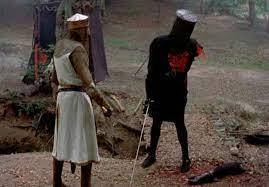
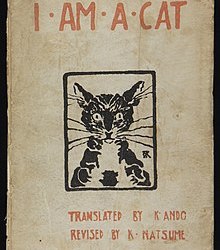
especially in the case of Final Fantasy. with very few exceptions like 7, a lot of them fit better wtih an EN script bc of how much western themed theatrics and setting is packed in there.
as an example, i think i prefer seifer in ff8 for example going "One of these days, I'm gonna tell ya 'bout my ROMANTIC dream!" like a dumbass jock over "itsuka kikasete yarusa! ore no ro~~~~~mantikku na yume wo na!" like a dumbass JP highscooler (which he kind of is, but still not a dipshit jock)
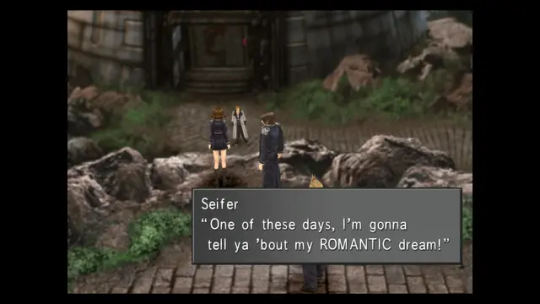

so its really the little things like that. subs not dubs doesnt work for me anymore, im in a very strange place, kupo.
another thing is really, just... the tropes. the deep disconnect between how people behave irl and how anime thinks people behave irl. kind of like how Hayao Miyazaki puts it in 2014,

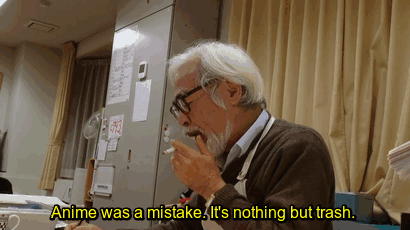
so, learning Japanese has actually done a weird bit where it's caused me to actually fully understand the JP, meaning when i pick up on the script getting off putting, it gets off-putting.
when people usually go "subs not dubs", its voiced from a sense that the JP voice is better than EN. but as the years go by this isn't really true anymore, some dubs can have serious quality that's unthinkable back in 2010 ffs. i think this is largely bc anglo-speaking audience do not understand JP, and so builds an imagination between the sub and the tone of the voice acting to carry the work.
but just like old ps1 horror games, that imagination is doing a good bulk of elbow greasing.
to explain:
there are times when JP writers puts in an objectively anime trope or thing. especially in the case of FE, where sometimes that it becomes 'ew' to people who aren't hardcore anime nerds. im talking things like the whole big booba onee-chan Camilla and the kawaii imouto/otouto Sakura and Takumi tropes thats kinda there in FE Fates. and the JP version of Anna's S support in Engage and the weird undertones thats going there.
masking it with subs can cause the audience to kind of brush it off as "aaah those silly japanese" or "ok this is just an anime trope". i mean, hell, check some discourse from people who yell about how this is censorship essentially defending it from what is effectively lolicon tropes and it's just. :v
and thats the thing. once that localization or sub barrier is removed, once im hearing actual JP and past any subconscious filter, i fully see the scene in its original form. i would then have a reaction exactly like hayao miyazaki.

having that ignorance kind of protects an audience from just how deep the writers ouroborous'd themselves into the nerd sphere. i kind of wish i had that sometimes. the creep vibes in some original JP scripts makes me want to crawl out of my skin, and there is no way i can explain this to an audience without first sounding like im disparaging the original work, shitting on the writers, and bringing in my personal bias into the conversation.
which, yeah i guess it kind of is. but man. if elden ring can commit to their bit with anime tropes used in a good/interesting/subtle way, then so can every one else.
when i started learning JP to play JP games never to see the light of localization, this was not the experience i expected, tbh.
so in summary, im totally disillusioned to the idea of Original = Best, Localization = Censorship at this point. that rose colored glasses are hanging on by a thread now. kind of wondering what other stuff i'll run into but it's been a real interesting journey that i totally get if people wont understand.
loneliness and language learning goes hand in hand lol
10 notes
·
View notes
Note
Hello! When researching Conall I read some description of him (can't remember what or where) where they described his one black eye as being completely black (as in, the iris and the sclera are both black), but in all other descriptions (mainly thinking of Da Derga's Hostel, the retelling of Conall's death by Candlelit tales pod, and the Championship of Ulster) where he is described with one black and one blue eye (just the iris I assume?). What are your thoughts on the completely black sclera?
(I'm sorry if this post is a bit stifled or weird, I had a few reflexive Ctl-Z's that have had me rewriting chunks of this post several times)
Heya!
As far as I am aware, that description of Conall is only found in that portion of Togail Bruidne Da Derga (which, for those unfamiliar, I provide an excerpt from Stoke's translation) that you mention.
‘There I beheld in a decorated room the fairest man of Erin's heroes. He wore a tufted purple cloak. White as snow was one of his cheeks, the other was red and speckled like foxglove. Blue as hyacinth was one of his eyes, dark as a stag-beetle's back was the other. The bushy head of fair golden hair upon him was as large as a reaping-basket, and it touches the edge of his haunches. It is as curly as a ram's head. If a sackful of red-shelled nuts were spilt on the crown of his head, not one of them would fall on the floor, but remain on the hooks and plaits and swordlets of that hair. A gold hilted sword in his hand; a blood-red shield which has been speckled with rivets of white bronze between plates of gold. A long, heavy, three-ridged spear: as thick as an outer yoke is the shaft that is in it. Liken thou that, O Fer rogain!’
Now, this is a very interesting description. What stands out to me is the description of his curly hair catching nuts, which is obviously connected to descriptions elsewhere of warriors' hair (or in one instance, a boar's razorback) being so spiky that falling apples are spiked on it.
And then, a similar description appears in Fled Bricrenn (which I'm assuming is the Championship of Ulster you mention there?) which I will provide the incomplete ITS translation (which you can read in full here).

The scribe of Fled Bricrenn is probably borrowing from Togail Bruidne Da Derga or from another earlier source (which Togail Bruidne Da Derga would also be drawing on), because we know that whoever composed this story originally was very well versed with Ulster Cycle material. For example, the description of Bricriu's Hall is based on the description of Conchobar's Hall in Tochmarc Emire.
If we look at the death of Conall Cernach (Aided Ailella 7 Chonaill Chernaig, which has been edited and translated by my Academic Big Sister for her PhD right here) we can see that there is no reference to Conall's eyes (similarly, the older translation by Meyer also doesn't have this detail). So, what appears to be the case is Candlelit Tales was expanding on the actual source material by incorporating elements from other stories.
But, on to your question: What do I think about this eye? Well, because I am an academic I will apologize that before we get to my thoughts, we must cover the previous scholarship on the topic.
This has only been discussed once, in an article entitled 'Portraits of the Ulster hero Conall Cernach: a case for Waardenburg’s syndrome?' in Emania 20 (2006) pages 75-80, by William Sayers. As you likely can guess based on the title, in this article Sayers argues that this description of Conall is modeled on Waardenburg's Syndrome.
Now, of course, this isn't impossible. However, I am generally of the opinion that attempting to diagnose historical or literary figures is a very challenging thing to do. While it can certainly be done (particularly when combined with archaeological finds), when dealing with a literary figure we would need to take into account contemporary medical knowledge, and I'm unsure if we have any examples of medieval Ireland being aware of such a syndrome. If they were, we should be interpreting it through their medical knowledge rather than our own.
That aside, I actually do have my own opinion on the matter. I think this is an artistic flourish intended to communicate how terrific (in both senses) Conall is, which I would argue is apparent when we take into account another notable example of a described heroic body.
As mentioned above, this description of Conall is already incorporating visual elements from the 'Apple Hair' scenes in other stories. And then, we can take into account descriptions such as this of Cú Chulainn from O'Rahilly's Translation of Táin Bó Cúailnge Recension 1:
‘In the chief place in that chariot is a man with long curling hair. He wears a dark purple mantle and in his hand he grasps a broadheaded spear, bloodstained, fiery, flaming. It seems as if he has three heads of hair, to wit, dark hair next to the skin of his head, blood-red hair in the middle and the third head of hair covering him like a crown of gold. Beautifully is that hair arranged, with three coils flowing down over his shoulders. Like golden thread whose colour has been hammered out on an anvil or like the yellow of bees in the sunshine of a summer day seems to me the gleam of each separate hair. Seven toes on each of his feet; seven fingers on each of his hands. In his eyes the blazing of a huge fire. His horses' hoofs maintain a steady pace.'
Now, this scene (another example of it is found in Recension 2 but it is different in some elements) often confuses people I am teaching this material. This is supposed to be a description of how wonderful or beautiful Cú Chulainn is, but his body appears strange or different. Burning eyes, seven toes, seven fingers. In Recension 2 he has four multi-coloured dimples, seven pupils in each eye, so on and so forth. This doesn't seem beautiful, it seems... awesome, both in the more recent positive sense, and the older more 'overwhelming' sense.
I have been asked before if Cú Chulainn always looks like this, or if this is a transformation, or something else. And, well, it is not entirely clear. We have descriptions of Cú Chulainn where this clearly isn't the case and others where it isn't established. For Conall, we don't get many descriptions of his complete body (as an adult, we have one of him as an old man which is quite different). What we can say, though, is it clashes with the idealized flawless heroic body discussed by McMannus (McMannus, Damian, 'Good-Looking and Irresistible: the Hero from Early Irish Saga to Classical Poetry,' Éiru 59 (2009): 57-109).
With this in mind, I think that these scenes aren't really literal, but more figurative descriptions going into luscious, awesome, terrific depth to establish the seriousness of the moment, the glory of the hero, and so on. The hero isn't as much transformed as being cast in a different light to communicate the moment. And this! I have a great analogy for.
In animation, artists often distort or change a character to similarly communicate 'feeling' in the moment. Take three examples from the television show One Punch Man, all of the same character, Sitama.
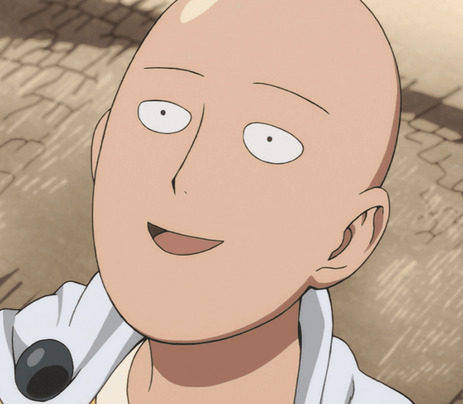


In these scenes, the character Sitama isn't 'transforming'. These changes in his body aren't something 'seen' by people inside the story world. It is a visual effect intended to communicate things to us, the audience. In the first, we have a standard illustration of Sitama. In the second, a serious moment where we see him putting his complete effort into something. In the last, a comic moment.
I think these descriptions of Conall, Cú Chulainn, and other ones for other heroes are similar to this. They're intended to communicate the feeling, the sense, and the emotion in the moment, rather than something we are intended to understand is how they 'always' look.
However! What remains in this is to ask, if this is some sort of literary trick to communicate tone or feeling or the like, what do the individual parts mean? What's with the Apple-Hair stuff? Why the fire in the eyes? Why the seven fingers? So on and so forth. Well, a lot of this is lost to us, but parts we can identify. Personally, I think the Apple-Hair thing is a reference to Boar's Razorbacks (in the scene with Conall, this is being riffed on and changed to work with curly hair) connecting warriors to boar. The 'fire in the eyes' thing is just an Indo-European motif for warriors (see: McCone, Kim, 'Warrior's Blazing Heads and Eyes, Cú Chulainn and Other Firy Cyclopes, 'Bright' Balar, and the Etymology of Old Irish Cáech 'One Eyed',' Zeitshrift fur Celtische Philogie 69 (2022): 183-200).
Exactly what the situation with Conall's eye is, I'm unsure. But, I think it exists within the broader literary tradition as a 'tone setter' rather than necessarily a literal fact of his appearance.
And all of that to say! What do I think of the difference between Conall having a black Iris v. a fully black eye? The one text of which I'm aware where it is mentioned doesn't clearly state what it means in regards to the eye. In the original language (Knott's edition) it reads: duibithir druimne duíl in t-súil aile. I think both interpretations of the eye are valid, but I expect that it is just intended to be 'iris' based on the description of Étaín's blue eyes at the start of the text using a similar grammatical construction (glasithir buga na dí súil, compare with the description of Conall's blue eye, glaisidir buga indala súil).
#mythology#celtic#irish mythology#celtic mythology#cu chulainn#celtic myth#conall cernach#medieval irish
23 notes
·
View notes
Text
Here's an AU Idea for you all that I dumped into R0's discord a little earlier while I write more demon posts Characters have had massive personality shifts because it's my AU and I get to play with my blorbos
Tags: Very much unwanted arranged marriage, bodice...ripper??, dumb medieval marriage beliefs and problems, Religious and political corruption/intrigue, medieval-fantasy setting. Weird blend of Unovan characters and also Hisuian characters.
CW: Unpleasant Non-con/descriptions of unwanted physical contact, Kamado is an absolute bastard, AFAB Reader for this one, And lots of corruption in institutions of power, and mentions/threats of abuse; Vague Religious Assholery as well.
If I write a fic for this, it will prob be gen neutral but I made the reader a Lady for this one- However, In this AU it doesn't matter if you're a noble daughter or a noble son or a noble's child, if you've been betrothed by the Church™ then woe be unto you unless you actually like your spouse.
A medeival-esque time period in the pokemon world- In a far off, fairy tale region...
Reader/Darling is a daughter of a noble household, who, for terrible reasons beyond her control, has become the betrothed of the celebrated general Kamado, a distinguished commander in the King's Army.
Kamado may be nice among company, but alone or among his lower ranking men, he's an absolutely horrible, terrible, vile old man- Far older than you, with a penchant for his mistresses and a hundred more vices that would take too long to list- He's quick to anger and slow to calm, taking his frustrations out on those weaker than him.
And of course, you don't want to marry this man. Aside from being much older than you, you've learned of his cruel nature from the very first day you met him- The strangely crude way he spoke to you, the way he tried to isolate you- Separate you from your family and talk to you alone- The way he grabbed your wrist when you refused to look him in the eye- You never wanted to speak to such a horrid man, ever again! And yet- Here you are.
The reasons darling has become betrothed to this general is several-fold. It suits many a powerful person very well- Except for you, of course!
The King offered a reward to Kamado for his exemplary services in battle for the kingdom. He's looked at you many times, but you're not just some common woman he can take for a mistress or a night- No, he'll have to buy you. And so he asks the King to give him you as his prize.
Your (probably not very nice) parents want the prestige of Commander Kamado's name- as well as a claim for their future generations on his title and lands and wealth.
And not only that, but the Church™ has agreed most happily to the marriage- The Sages of the Church™, after all, are very loyal to the King and- Well, he's ordered them to condone it, despite the significant age difference and your own protests. Now, Kamado is aware as well that you don't wish to wed him- He watched you rise in anger when the King and your father declared your betrothal. And he knows for a fact it's been a... problem, before- with young brides and grooms who do not wish to be wed "against their will" or whatever it was that- They'd often take the alliance of pokemon and abscond into the night with some vagabond, or on the wings of their beastly companions-
So instead, Kamado asks the Church™ to ensure that, for the Year and a Day you must wait to be married, that one, you stay "pure" before your marriage to him- And two, that you don't abscond into the night with the Gardener's son or your maid or something like that, and vanish.
And so, the Church™ has a wonderful solution! Enter the two finest paladins in all the land, armed with their beautiful, deadly swords at their sides, to guard you night and day: Sir Ingo and Sir Emmet!
As paladins, they've taken oaths of chastity- And having been raised by the church since they were children, the Sages have no fear that they would break their vows- Or even have interest in a mere little noble like yourself.
And at first, the twin paladins are more than okay to fulfill their holy duties- You're obviously just afraid of marriage, that is alright! Yes, Kamado is... older than you, but- Surely, he'll make a fine husband for you. Won't he?
The paladins try to comfort you, but every night- As they stand guard outside your door, they can hear you sob. More and more frequently as the days pass by, and your marriage to Kamado grows closer and closer.
And they watch, feeling an ever creeping sensation of disgust every time they must follow out of sight when you are with Kamado- Who pulls at your face and demands a kiss from you, and dares to raise his hand against you if you pull away too much-
Both the twins can't believe what they're seeing. Kamado, after all, is a celebrated hero of the land! He shouldn't act this way towards the one he has chosen as his future bride! Ingo shudders to think what Kamado would do if they did not accidentally make themselves known- Or use their own pokemon to interrupt the old bastard grabbing you.
They silently hope that maybe- Maybe it's just something they don't understand, not being permitted to court any young ladies themselves, given that they're Paladins-
Until they have to interact with the old man alone on several occasions- Or worse, they see his mistresses, his drinking, the cruel way he treats his servants and underlings around his castle- And the way he refers to you, no better than a piece of meat, when he thinks he's in company of those with a similar mindset-
They can't stand for this! They must help you. Kamado is not worthy of being your husband! Not in a million years would he ever deserve such a kind, beautiful, wonderful, lovely Lady...
But still, they speak with your parents- Who are aware of your objections, are aware of Kamado's nature- But what does it matter? Marry him, and the wedding gift he'll make to them will be more than enough to keep your family's estate running for several years. Besides, why should they turn down Kamado now? It's not like there's any other suitors lining up to take your hand.
Realizing the futility of the conversation they turn to their beloved Church™- The bastion of righteousness, morality, and courage they've drawn from their whole lives-
And the Church threatens to relieve them of their duties if they allow anymore of their personal feelings to get in the way. If they cannot guard you without getting in the way of your betrothal, then the Sages will just lock you up in the Inner Sanctum of the Church until the day of your wedding- At which point you'll be so happy to see the Sun again you'll be more than willing to listen to anything Kamado says, if he threatens you with confinement again.
Ingo and Emmet's hearts break as they watch you become more and more reclusive- You seclude yourself in your family's library, quietly reading some old fairy tales- Books of innocent youths held captive by evil wizards and salamences, saved by daring heroes on the back of Rapidash and Mudsdales, armed with blessings from legendary pokemon-
Could they not become the heroes you so quietly, desperately yearn for...? Though the twins realize you don't like, or necessarily trust them- Because, they know now, they aren't guarding you.
They're keeping you imprisoned.
So they will do their best, over the remainder of the Year and a Day, to befriend you- To defy their own teachings and their orders- To love you, to win your heart- And free you from your confines.
Other notes:
Ingo and Emmet both have Aegislash- Their noble, royal swords. However, these Aegislash are different than run-of-the-mill ones. Aegislash looks different depending on the blade it's possessed- And Emmet's Aegislash is a beautiful, white-silver blade with a gorgeous, white silver shield- inlaid with sapphires and a beautiful white stone set in the hilt, and it's "arms" are made of a strange white silk.
Ingo's Aegislash is black-iron, and hooked- The shield it bears is heavier than most, and the fabric making up it's arms is thicker, but very plush. It is inlaid with rubies and the hilt has a strange, black stone upon it...
Long ago, Ingo and Emmet were two soldier boys, recruited into the army primarily as a means to keep themselves fed- Where they came from exactly, they couldn't even tell you if they could remember! Just that, when they were free, they would explore some of the forgotten reaches of the King's Castle... And one day found an old, sealed room-
Inside were two blades, long slumbering- Long held captive by a line of Kings they'd deemed Unworthy- Only to awaken to two brave young youths- Who held the spirits they longed to serve. Armed with the King's Blades, No one in living memory knows the true meaning of these two ancient swords- Except the current King. His own daughters had failed to wake up the swords- And his failure of a son- The freak who had a heart only for books and pokemon- Hadn't even been permitted to try.
None of them had been able to awaken the blades that only served those worthy of being Kings. King Ghetsis was furious- His beloved beautiful daughters- Praised as Incarnations of the Goddesses by the Sages of the Church™- Had failed to awaken the ancient Swords, as did so many of his ancestors prior- But these two strange twins, bumpkins from some old mining town, had?
Ingo and Emmet also don't know the meaning of the blades they carry, but they certainly make the two a force to be reckoned with.
Also Headcanon about Aegislash- When it's being wielded by an actual human being, they have a different form they take on, as opposed to their sword or shield form- Their Wielded Forme. Sword in one hand, Shield in another- Their ribbons become armored guards for their holder, or they'll take their sword or their shield and wield it for their master, expertly protecting them from even a hoard of assailants.
Ghetsis's Children are Anthea and Concordia- Absolutely terrible people who bear no resemblance to BW Anthea and Concordia who think they deserve the throne because they want it. And N is here as well; He's a bookworm, and a lover of pokemon and truly wants what's best for his Kingdom, but Ghetsis despises him for his pure and truly righteous heart. If he'd been given the opportunity, the legendary blades would've most likely responded to him, as well- Or at least, one of them would...
As Paladins, both Ingo and Emmet are exceptionally "morally upright" and both very courteous- Selfless, courageous, and slightly naive as to more sinister happenings in the world. Ghetsis realized they'd been recognized as "King Material" by the Royal Blades and handed them over to the Church™, controlled by his Sages, to make the twins into loyal puppets for his own purposes.
Other other notes:
Emmet is actually the better swordsmen than Ingo is; That is not to say he is violent, or uses his sword more frequently- He's just very competitive. His left-handedness can make him a surprising opponent for some people, which can give him an edge in fighting. Rarely. He quite adores taking care of baby pokemon, as well as training younger paladins- He's a popular sparring partner.
Ingo is the more diplomatic of the brothers- And an expert in shield fighting. He will have his enemies either knocked flat or already bashed in their heads with the heavy iron shield of this dear Aegislash- Though the hooked, curved blade is certainly nothing to scoff at- It's considerably heavier than Emmet's white-silver blade, and thus is more unwieldy- But the power behind each strike dents and cracks plate armor, even without Aegislash providing any spectral power to it's blows. A clean hit to an enemy is almost always lethal- And Ingo would rather not kill his opponents most of the time. He likes plants- And especially flowers, despite his seemingly dark demeanor.
#Not necessarily implying Ingo and Emmet would be Kings in this AU but that they have the qualities necessary to become Kings if they want-#Apologies for the long rambly post#Once again midnight posting#Paladin AU#Submas Paladins#Emmet X reader#Ingo X Reader#Ingo / Reader#Emmet / Reader#Kamado is a lil bitch#Kamado Slander Club#Expect more on this idea later
94 notes
·
View notes
Text
Ten Books To Know Me
Rules: 10 (non-ancient) books for people to get to know you better, or that you just really like.
Tagged by @landwriter, whose list I am pillaging for reading tips. In no particular order:
Paladin of Souls - Lois Bujold. Cordelia Naismith is still my favourite of her characters, but the World of the Five Gods series is so kind. Bujold does religion better than anyone, and in a deeply humanist way. The exact inverse experience of reading Maria Russell’s The Sparrow, though both are phenomenal.
Labyrinths - Jorge Luis Borges. The short story collection version of someone leaning in and going “would you like to hear a fucked up thought about set theory? No? Time?”
Watership Down - Richard Adams.
I was (understandably, I think) leery of books with rabbits after my Mom insisted that the first time I’d broken down sobbing over The Velveteen Rabbit was a fluke, and I’d misunderstood the point of the book, and then tried reading it to me another two times. I cried every time. HER point is that the bunny became real at the end, so it’s a happy book. MY point is that to the boy, the bunny was real the whole time, and that from his point of view it was essentially one of those horribly moralising 19th century fairy tales where the main character’s best friend dies horribly half way through but they go to Heaven so you’re expected to be happy about it. Except in this case, they’re burned alive. Watership Down was the runner-up for most traumatic childhood book about bunnies, but it made no bones about what it was. It knew when it was being brutal, and did it on purpose and well, and I love it still. It also was one of several deeply formative books for introducing me to my favourite trope: stories-in-stories.
The Lord of the Rings - JRR Tolkien. Yes, I know, everyone’s favourite, etc etc. Still, I read it young enough to sort of grow up along it as a trellis. I can’t put any of my favourite medieval works on this list per the rules, but Tolkien’s the reason I could read them as an adult and go oh, but you’re familiar. Also, the older I get, the more the whole ‘no kindness is ever wasted’ element makes me verklempt.
Jackalope Wives - T. Kingfisher. I know, it’s not a book, but you’ll forgive me for that once you’ve read it, for free, right here: https://apex-magazine.com/short-fiction/jackalope-wives/
How good was that? Right?
Gaudy Night - Dorothy L. Sayers. I’ve never related to anything or anyone more than Harriet Vane as I read this, belly down on the grass in the Oxford botanical gardens this summer, in the middle of having a Bad Fucking Time romantically. Sayers’ characters are complicated and human, a little too smart for their own good sometimes, and prone to self-sabotage and overthinking. This book is so profoundly good at capturing the absurdities of love, and the negotiations of self that requires, while still being very tender about the whole thing.
American Gods - Neil Gaiman. I’ve never been in the US for longer than three months at a stretch since I was three, and growing up, it was largely mythological to me. America was Where Stories Happen. I read Stardust first, and possibly like Good Omens best of Gaiman’s, but American Gods put words to a lot of the experience of looking at the US from a one-foot-in-the-door-one-foot-out perspective.
Caedmon - Denise Levertov. Once again cheating, this time it’s a poem:
http://www.southernhumanitiesreview.com/denise-levertov-caedmon.html
I’m also a tremendously basic poetry person in terms of liking Donne, Blake and Eliot. Mmm, weird feelings about God and/or WWI.
The Lacuna - Barbara Kingsolver. Possibly my favourite ending in anything I’ve read ever? I can’t say anything concrete without spoiling it, but the book starts out big, and then, at the end, gets narrower, and narrower down to a fine point, and - look, it’s very good. It has opinions about how we tell stories. The Bean Trees is also very good, though it’s been near a decade since I read that one, and I remember it less.
Frankenstein - Mary Shelley. Look, it has stories within stories, and a big, gothic, sweep of thought and emotion. It feels big, and deep, and bigger and deeper every time I go back.
Special mention because almost everyone who follows me is into Sandman: Doomsday Book - Connie Willis.
Would you like to CRY about the middle ages, and how people were people always and how no kindness is wasted? I bet you would. Maybe only read this if you’re feeling stable about pandemics again, though. I’m giving it another few months personally before going back.
-
I am, as usual, a tiny bit late to the tagging game and have lost track of who’s already been tagged. HOWEVER, I have a bunch of lovely amazing mutuals and new followers and if you want, please consider yourself tagged (that way I can also see who’s interested in maybe being tagged in the future, and get to know you better?)
#special mentions to half a dozen exceptional sci-fi/fantasy series i had to cut#Le Guin's left hand of Darkness#Ann leckie's ancillary justice#and Seth Dickinson's traitor Baru cormorant#particularly#also#landwriter's prev tags: tamora pierce#tiny six year old me spent SO MUCH TIME hitting things with sticks pretending to be a knight
17 notes
·
View notes
Text
It's that time of year again! Time for my list of potential nano plots that I may or may not choose and might decide against at the last minute, but I like listing anyways.
Option 1: Maud Grey's Halfway Home for Failed Magicians (Rewrite)
Basic plot: A wizard in a fantasy world attempts to create a portal to another world, however he apparently fails and wakes up in a remote, isolated Home where magicians supposedly recover from the damage done by their failed workings. There he realizes he has actually developed a psychic link with a high school student in another world. Meanwhile, all is not well in the Home, and the mysteries keep piling up. Ales and Violet must work together to open a real portal before their mistakes and the mistakes of those who came before catch up with them
Pros: this would be a rewrite of my 2020 nano, so I have somewhat of a plot to work off of. Also have a lot of great worldbuilding ideas for this fantasy world that were not in the original so those will be fun
Cons: I tried rereading my 2020 nano a couple days ago and y'all....it is rough. ROUGH. i tried this stupid 3rd person omnicient point of view that SUCKS, and also gave my teen MC my personal anxiety struggles from when I was 16 and...dropped them a couple thousand words in when I realized that I could not possibly motivate her to do anything in that state. There's a reason I was a basement dwelling weeb teenager. I can fix all that in a rewrite but the cringe is just. lowkey killing me OTL.
Option 2: The One Set in the 50s
Basic plot: a young theoretical physicist and his new wife sign on to work at a privately-funded experimental facility in the middle of nowhere. While he works in the lab, she will be working too--for the entire community is a social experiment of uncertain purpose.
Pros: Brand new! Both in terms of not having been done before as a nano and being a new genre and character archetypes for me. I think this could be very creatively beneficial and fun!
Cons: Since it's new, it'll probably be Difficult to either plot or figure out the characters/setting etc, and I struggle with Difficult writing things nowadays (see: last year's nano that I gave up on like 10k words into).
Option 3: Bright Eyes (Rewrite 1.5)
Basic plot: this was my nano from 2018. A bunch of young adults in a college town in the mountains are blackmailed by the local faeries into solving a bunch of murders. There's monsterfucking. Alien conspiracies. Queer drama. Sheltered, closeted, and isolated teens figuring out adult life. Someone's weird cousin who's just there. You know the guy.
Pros: a rewrite, so easier because again: most of a plot is already formed. Lots of characters and situations I enjoy.
Cons: tried to rewrite this one already (and then somehow lost that draft??), and I suspect it doesn't need a full rewrite so much as a boatload of editing, which doesn't make it great nano material
Option 4: Medieval!AU Fanfic of My Own Damn OCs (copout)
Basic plot: okay so, these characters are all ripped from another story that will Never see the light of day (it's one of those Daydream Tales that simply cannot be written on paper), I just chucked them in a castle to see what would happen. Prince Terrance is arranged to marry the daughter of the most powerful wizard in the kingdom, but when she arrives it becomes clear that the wizard has bigger plans than being a royal-adjacent parent-in-law. Shenanigans ensue.
Pros: this would be just for the lulz without any pressure or expectation that anyone would ever have to see it. could literally sit down every day and smash random words into a doc like this is a medieval soap opera, no pressure.
Cons: once again I worry that I might run out of plot. As with any story with a romance, I think the ~main couple~ would get together pretty fast bc I'm just not interested in writing slow-burn pining and whining (read? yes. write? kill me.) and then....what? 40k more words to fill with wizardly evil plots. Hm.
#i may find more of these eventually but these are the 4 I'm interested in right now#i want to choose a plot For Real by october 1 so I can do real worldbuilding and plotting#no changing my mind at the last minute and leaving myself in a lurch#anyway.....let me know what one you would pick. I'm currently torn between 1 and 2 but i just thought up 4 and that would be promising
5 notes
·
View notes
Text
Touching the Ancient: Fact and Fiction

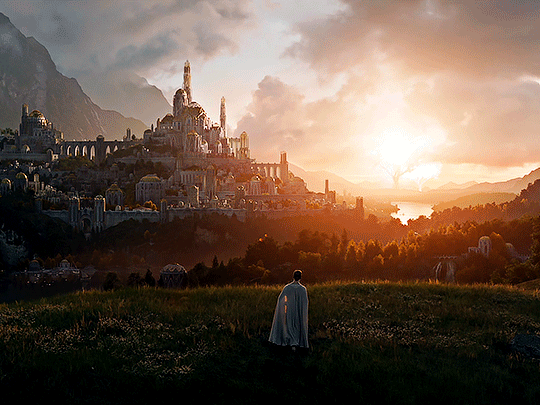
There exists a fascination within our fictions with the idea of the ancient and our proximity to it. Whether it's sprawling archeological adventures, vast forgotten cities, or the writings of those long past, the ancient begs to be heard in the ruins of our ancestors, be it stone or page. The ancient compells us, transforms us, and inspires us forward. Nowhere does the ancient affect us more than in fantasy, that genre where the ancient need not be present at all, yet has more prevalence and dominion than in almost any other genre.
But where does that stem from?
It is hard to imagine such ancient fascination originating anywhere outside of the Mythology of our religions.
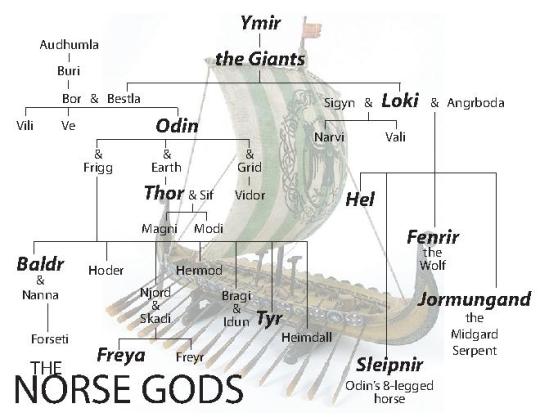
Mythology is the ancient that is still (in so far as it pertains to religion) relevant. Here, I used Norse Mythology, because of its relation to stories such as Beowulf and Medievalism, but take your pick. Hinduism, Buddhism, Judaism, Zorastrianism, Greek, and/or Egyptian mythologies all create a narrative that explains why the ancient is immediately relevant. Fantasy, it can and has been said, is a direct descendant of Mythology, extending back to the kinds of myths that are now staples of literature, like the Epic of Gilgamesh or even The Odyssey.
But something happens in the 19th century that changes the layout of ancient history. After Napoleon Bonaparte set out to claim the ancient world for himself, essentially creating the idea of the Meuseum, we set off on a path to reclaim our origins. We start trying to go back, to pinpoint the earliest stages of our existence. Science has become the dominant source of knowledge, and historians and archeologists have become more than just academics, but conduits to a lost world. Thus, it was only natural that during this period, where fact and myth were endlessly enmeshed, that stories began to emerge that radically shifted what "ancient" even was.

Pulp fiction was certainly not the first foray into the ancient, but it was one of the earlier elements that capitalized on our newfound obsession with discovering the ancient. Conan the Barbarian leapt off of the page because his stories doubled down on ancient, marrying our consideration of what was ancient to an even earlier ancient filled with eldritch monsters and secrets best left buried.
"Know, O Prince, that between the years when the oceans drank Atlantis and the gleaming cities, and the years of the rise of the Sons of Aryas, there was an Age undreamed of, when shining kingdoms lay spread across the world like blue mantles beneath the stars - (...) Hither came Conan, the Cimmerian, black-haired, sullen-eyed, sword in hand, a thief, a reaver, a slayer, with gigantic melancholies and gigantic mirth, to tread the jeweled thrones of the Earth under his sandaled feet."
Conan's age before written histories was an endless opportunity to tell the human story with all of magics of our myths but without the confines of conflicting dogma. Lovecraft's tales invoked fear and the utter unimportance of humanity in the face of the ancient cosmos, while Edgar Rice Burrough's tales sang of a new dominance over the ancient by the modern man in Tarzan and John Carter. The early 1900s were a breeding ground for the kinds of stories that would later inspire the masses.
Now there is a taste for the weird and a desire for the old. Enter, Tolkien.

(You didn't really think I'd go an entire short essay without bringing him up, did you?)
A linguist with a fascination of mythology and weird stories, the dear professor decides to enter the game. He wants to write his own history of our world before the dawn of recorded histories, but he's got his own ideas on how detailed he wants to be.
Rather than merely creating another history, Tolkien's mythology instead seeks to tap into the ancient by recreating the historical hurdles that historians face. The books we get are (according to Tolkien, *wink * *wink*) translations of copies of copies of retellings and secondhand accounts with lots of missing data.
"Tolkien used the language of the historians to create fabricated history with all of its flaws. This sets up a world where the past is immediately relevant, something Tolkien desperately wanted" (I'm paraphrasing Sherrylyn Branchaw here).
The world of Middle-earth is ancient for us, but contains the ancient within. The Elves have risen, and fallen. Morgoth's legacy remains, but his person is gone. Gondolin, the twin trees, Numenor, all ancient and almost forgotten in the time of Bilbo and Frodo.
The fantasy genre as a whole is subjected to the ancient as a trope after this. From the Howard-esque sword and sorcerous world of Michael Moorecock's Elric of Melnibone, to the endless stories of myth and magic, the ancient is the obsession of the "nerdy" even unto genres you wouldn't expect. So many superheroes get their powers from ancient beings (Shazam, Dr. Fate, Thor himself, etc) and even in the most iconic space operas....

Its a part of Star Wars that people often forget, but the where of this story is just as important as the when. It's the starting point, before all else, it has to tell you that this story is distant from us, but also ancient to us. And somehow that makes it just a slight bit more compelling.
Though the colonialism that is embedded in the "scholar/explorer" genre is definitely something that should be recognized and acknowledged as harmful, the fascination with the ancient (and those of us that love it) is compelling in almost any format.
(Side note: Dr. Justin Jacobs has a wonderful seminar/podcast discussing the "Indiana Jones within History" [which is also a book he wrote,] that is a genuinely a fun read/listen and very informative on the subject.)
Although stories like Indiana Jones tends to be far more fiction than fact, the compelling element of such stories isn't in their truth, but in their possibilities. Dr. Jones says it best in his classroom, "Archaeology is the search for fact—not truth" and while myths may not be true, the bones of these stories is brimming with poetically resonating facts.
As we look forward to new medias, new stories, new myths, and new sagas, I hope we leave the need for truth behind. I long for a day when a story's merit isn't in its "realism" or its plausibility, but in its spirit and its myth. I look forward to the day when we let go of the need for things not to be silly, so long as they are sublime and awe-inspiring. I long for a day when we watch an unrealistic movie and are enchanted by the wonder of the story and the beauty of a book.
That's the power of the ancient in our stories. The power of the tales told round the hearth. None of the best stories are realistic at their core, though "real" might be an ingredient. It's the wonder of a story that matters, and I'll take wonder over reality anytime.
While we look for stories in a new age to love and hold dear, look for the stories where the ancient is alive, where the stories, regardless of plausibility or reality, are living. As Dr. Jones says, "one of the great dangers of archaeology; not to life and limb, although that does sometimes take place. I’m talking about folklore."
~Ramoth13
#ramoth13#The Ancient#archeology#indiana jones#indiana jones and the dial of destiny#the lord of the rings#george lucas#robert e howard#lovecraft#harrison ford#conan the barbarian#michael moorcock#tarzan#edgar rice burroughs#adventure#history#sherrylyn Bradshaw#jrr tolkien#film#lord of the rings#silmarillion#the hobbit#fandom#mythology#religion#myth#star wars
10 notes
·
View notes
Text
hmmm okay i went into nimona fresh off reading the graphic novel and expecting to be very disappointed and i think that possibly hampered my enjoyment of the movie. maybe i could have enjoyed it more if i had gone in completely blind but also family animated movies are just not usually what i care about so it's also likely it would not have made a difference
the changes made to the first half of the story seemingly in "service" of the lead gay couple sucked. nimona's new backstory and the subsequent final act i think actually worked quite well and all the fun little details of the setting were quite visually spectacular, but i think both of these successes come at the expense of what the original comic was supposed to be, which was a satire of the traditional fairy tale hero and villain narrative... like the "what if knights had tv" background of the comic book was to poke fun at traditional medieval settings. but by taking that really seriously what comes out is basically the same kind of "what if monster was really person" movie that has been made a million times already. like shrek. the movie is just shrek except it took out all the funny shrek esque elements that were in the original comic in favour of laser beams and flying chariots etc. which i think must be why it feels the need to justify the existence of knights in the setting within the first 30 seconds? cus i was definitely wondering what the point of all those genre trappings were if the city was also defended by drones and giant lasers.
does that make me like cinemasins. i dont know. i also noticed the existence of comic book technology in the setting also seemingly served to replace ballister having been a scientist in the original comic book, which was weird. and makes ballister kind of not able to do anything. like if you wanted to make a frankenstein movie where victor frankenstein wasnt actually a scientist so instead they just put reanimated corpses in everybody's houses in the background so it could still be a reanimated corpse movie. it's not actually much like that but i keep thinking about that comparison
i didn't like many of the design choices. i dont understand why you would make a movie of a 2010s nd stevenson comic book without adapting the original comic's themes OR the iconic art style. i dont want to say "why was this a nimona movie at all" but i kind of do wonder that. why did everything have to be so pretty
12 notes
·
View notes
Text
We are still having to campaign to get Israel out of Eurovision for their crimes. Keep those messages going out and remember not to interact with the official Eurovision youtube channel or the eurovision website. No add revenue during the boycott.
the EBU contact page: https://www.ebu.ch/about/contact-us
NRK: [email protected] or 23 04 70 00 if you have a local number
Gåte is on instagram: @gaate_official
Now for the song review. Warning for flashing lights.
youtube
Gåte is representing Norway at Eurovision this year with their song "Ulveham."
Their style is a combination of folk and prog rock that makes for a stunning and unique sound. It's gentle enough to be accessible to the pop-lovers, but goes harder in the chorus. I find the effect is a little undercut by the fact that the music cuts out when the lead singer is howling, but I have seen other people say that they like it that way.
The lyrics are taken from a medieval ballad and will have to be changed for Eurovision, so we will end up seeing a revamp down the line. But the story will likely remain the same. It tells of a girl whose jealous stepmother turns her into a wolf, saying the curse will only break if the girl drink's her brother's blood. Unfortunately for the stepmother, she counts as the brother's blood so the girl is returned to human form after killing the one who cursed her. Excellent fairy tale 10/10.
The staging is perfect for Malmo's weird cross shaped stage. The lead singer is on a rotating platform, so she won't need to do a bunch of extra work to make sure she plays to the whole crowd and not just the arbitrary "front" direction. The band members can travel across the various arms of the cross to interact with the standing area fans (except the drummer if he brings his set. He'll just have to be planted somewhere). I think it's a contender to close the second semi as it's a real show stopper.
2 notes
·
View notes